Announcements
- Details
- Written by: Danielle Techera
EIT’s Academic Resources, Higher Education, and IT departments have been working in the background over the past few months to revamp the EIT eLibrary, hosted on Moodle. We are pleased to announce that the official launch date is 1st October 2020!
What is happening?
We have updated the EIT eLibrary to a new, more user-friendly format. This includes new information to support students throughout their course, easier access to the IDC technical manuals, and a complete overhaul of the Open Access Resources content.
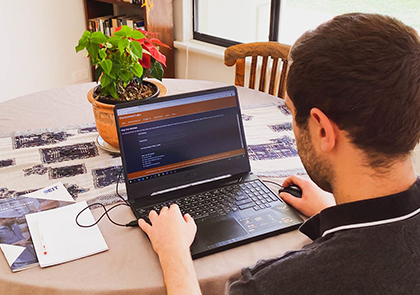
The goal of this update is to improve, modernize, and re-organize the learning resources available to students so that it is easy to navigate and provides more useful content. Some of the major changes include:
- An upgrade to the IDC technical manuals viewer to ensure eBooks are easier to read online
- A complete overhaul of the Open Access Resources content to include a centralized listing of reputable open access publishers as well as lesser-known open access journals
- A new section called Study Support with tips, tricks, and information on report writing, general writing skills, and exam preparation
- An updated library of our master’s graduates’ thesis papers
The new eLibrary will go live on Thursday, 1st October. There will be no changes to student access – everything will still be hosted within Moodle, and students can access the platform in the same way as before. The Academic Resources team will be constantly working on new updates and added content to ensure continuous improvement to the resources we offer.
We hope the new eLibrary will be a welcome improvement for all current and future students.
- Details
- Written by: Quintus Potgieter
The COVID-19 pandemic forced many education institutions to take entire campuses online almost overnight. Despite a massive growth and adoption in online education technology in recent years, many institutions struggled to translate their on-campus delivery methodology to an online environment and, in particular, were unprepared in how to ensure academic integrity online. This has resulted in a scramble to adopt exam proctoring and remote invigilation software, providing the Engineering Institute of Technology a competitive advantage and new business stream.
Over the last three years, the Engineering Institute of Technology has perfected an online exam proctoring, and remote invigilation software to autonomously monitor students while they undertake an exam. This system is named IRIS Invigilation.

IRIS was developed by the Engineering Institute of Technology (EIT) in conjunction with Curtin University in Western Australia. EIT is now the sole education partner of IRIS internationally and utilizes the software to invigilate online assessments and exams of 1600 students from over 140 countries. IRIS' usefulness has further been realized as the pandemic has produced new challenges for institutions that need to ensure the reliability and validity of student assessments.
"My vision for IRIS was to have an easy-to-run, very affordable invigilation package for our (and other colleges') students, and indeed, staff, to easily use at far-flung locations to demonstrate their commitment to a high level of integrity in their work," said Dean of Engineering at the Engineering Institute of Technology, Dr. Steve Mackay. The fully developed software seemingly made it to market just in time for the unexpected circumstance that cropped up this year.
"When coronavirus hit in early 2020, educational institutes who had been avoiding online education were forced into action. If this transition wasn't stressful enough, with all the technical challenges of schools, colleges, and universities going online, then they had to find a solution for online assessments and potential cheating," says Sarah Montgomery, Project Manager at EIT who is overseeing IRIS.
"As more institutes go online, we saw an opportunity to expand IRIS to other institutions who would benefit from remote proctoring," she continued. "IRIS has been warmly received with many potential customers valuing the dedicated IRIS technical team and evidence of EIT's own success in using the platform."
Deputy Dean at the Engineering Institute of Technology, Indumathi V, says she has seen the software in action and finds it incredibly helpful as an academic monitoring exams.
"I have seen IRIS in action, and it's fantastic! It empowers me as an academic to trust on the reliability, authenticity, and integrity of the assessments completed by my students. It works by recording audio, video, and computer screen activity for the duration of an exam/assessment. Staff don't have to go through every recording to verify assessment integrity or authenticity. Machine learning algorithms in the background do the work and flag potential academic dishonesty, which is neatly displayed on a dashboard. It's a well-designed, user-friendly system that integrates effortlessly into most computer systems."
The software had already racked up some accolades before the COVID-19 pandemic began threatening education institutions around the world. In 2019, the IRIS team secured the position of ON Accelerate Finalist, which is Australia's national innovation accelerator program, powered by CSIRO. In the same year, IRIS was a Highly Commended Education Finalist (Best Project in the Education category) at the prestigious ITnews Benchmark Awards.
How it works
IRIS records video of a student's face throughout their online exam. The program tracks head and eye movement, records the audio signal from a student's computer, and captures webcam audio too. The program takes successive screenshots of what the student sees during the exam, and what is displayed on their computer screen.
An extra security measure IRIS incorporates is facial markers. The markers are identified and tracked, categorizing and distinguishing innocent behaviors and cross-referencing them with dishonest behaviors.
IRIS departs from traditional methods of real-time online invigilation, which is expensive and time-consuming for educators and assessors. Upon the completion of an assessment, IRIS autonomously targets or 'flags' videos that need evaluation to prioritize students who require further investigation and keep staff workloads manageable. Educators can then review this data at a time that is convenient to help ensure student identity verification and assessment integrity.
Educators set the system on their online assessments through their own defined Learning Management System (LMS) such as Moodle. When a student clicks on the assessment, IRIS automatically pops up and asks the student to agree to being invigilated. Once they complete and submit their assessment, IRIS shuts down and provides the educators with all of the data gathered during the assessment.
"With the increase in the uptake of online learning and assessment due to COVID19, more and more educational institutions are grappling with assessment authenticity and integrity," says Indumathi.
"Autonomous proctoring provides an excellent solution to these problems, improving the quality assurance and reliability of online education.
"The future of proctoring is very bright with artificial intelligence (AI), big data (data forensics), data security, and user-centric developments taking center stage. These enhanced capabilities provide many opportunities for improvements to existing technology."
Lightweight, easily deployable, global
Students from all over the world are using IRIS. At the Engineering Institute of Technology, we have three years' experience in invigilating all online exams. Online exam proctoring cements the legitimacy of online education, which institutions have had to implement during the global pandemic. IRIS Invigilation provides a lightweight, easily deployable, and instantly accessible system for monitoring students while they complete online assessments.
The IRIS technology is secure, easy to use, and requires very little in the way of software infrastructure due to its efficient browser-based design. All the student needs is a Microsoft-compatible or Mac computer with webcam, microphone, and speakers connected. Most impressively, IRIS has a Google Chrome extension and Microsoft Edge plugin that can be added straight to the browser.
Sarah explains, "Students need to use the Google Chrome or Microsoft Edge browser because IRIS uses these browser plugins (extensions) to access your webcam, microphone, and screen. IRIS has been developed in this way so that you do not have to download bulky or costly software packages onto your computer.
Recently, IRIS was added to the Microsoft Edge store, so now Chinese students can utilize the software. This opens up a huge market for international students as previously IRIS did not work in China."
The IRIS team has successfully signed up several large institutes that deal with thousands of international and local university and college students.
"We have a client who specializes in English testing and another in the trade skills industry. One of our larger clients completed their university exams this week and clocked up over 15,000 assessment hours. IRIS is capable of handling huge amounts of data, and IRIS successfully invigilated and uploaded the recordings of over 3,000 students in the exam period," said Sarah.
"After significant financial investment in research over the past five years and tens of thousands of hours of testing, I have been gratified to see IRIS develop into an ultra-useful invigilation (proctoring) package," Steve remarked.
"IRIS has been adopted by many of the largest colleges in the world, and we are pouring more resources into developing additional AI capabilities as well as analytical support to provide feedback to the instructors on improving their courses with real evidence-based intelligence."
With the potentially chaotic reclosure of educational facilities due to a second wave of the coronavirus, investing in an online remote examination proctoring software solution is a good step in ensuring academic integrity online.
For further information, please contact
- Details
- Written by: James Mackay
Hi everyone,
We will be conducting an infrastructure upgrade on EIT’s Moodle site.
What is happening?
We will be migrating our Moodle site to a new and improved server. The goal of this upgrade is to both enhance the security and flexibility of our Moodle site.
Preserving both the integrity and security of our students’ data is something we take very seriously at EIT. The new infrastructure has a range of pre-configured security features that provide industrial grade firewall protection, system alerts for malicious activity, and frequent anti-virus scans. We also have the capability now of facilitating security patches with ease; enabling us to stay up-to-date with the latest security trends, while also ensuring we can streamline our future maintenance period.
How does this impact you?
Moodle will be unavailable on the 16th of June at 1AM UTC for a period of 2 hours.
All Learning Support Officers are aware of this downtime, and all BlackBoard sessions will be rescheduled if it occurs throughout this time. If you need any materials throughout this time, then please make sure you download them from Moodle prior to this maintenance period.
If you have any additional questions then please get in touch with your LSO.
- Details
- Written by: Elyse Simich
In light of the COVID-19 pandemic, the Australian Federal Government has announced a relief package, which means they are funding six-month higher education certificates in ‘priority areas’ – one of which is engineering.
We have been busy designing industry-oriented online undergraduate certificates and graduate certificates to help those already working in the engineering field, or those who want to enter the engineering field, retrain or upskill.
 For a small contribution, you will be able to earn a short qualification from EIT in the areas of electrical engineering, mechanical engineering, industrial automation engineering, and civil and structural engineering.
For a small contribution, you will be able to earn a short qualification from EIT in the areas of electrical engineering, mechanical engineering, industrial automation engineering, and civil and structural engineering.
Federal Education Minister Dan Tehan said this package was designed to give those affected by the coronavirus an opportunity to upskill or look at different career options for the future.
“We’re slashing the prices of degrees and diplomas in short courses to enable people, rather than binging on Netflix, to be able to binge on studying –areas where we need people, and we’re going to need people, as we emerge from the coronavirus pandemic,” he said.
This means that Australians can use their time in lockdown to gain new skills and knowledge in in-demand areas, so they are ready to rejoin the workforce post-coronavirus. However, you don’t need to be affected by the pandemic to take advantage of this opportunity to gain a new qualification.
Mr. Tehan said the government has encouraged education providers to develop courses in areas that will give students the required skills after the coronavirus pandemic.
“There’ll be an offering of short diploma-style certificates, and, also, an expansion of graduate certificates. So, these are six-month courses. You could either use them to reskill, or you can use them to change careers, or just to start learning.
“So, if your life’s been turned upside down because of the coronavirus, and, you think, ‘Okay, I might want to change careers,’ then this is a real opportunity, for the next six months, to take on board one of these short courses.”
These online short qualifications are known as micro-credentials and have become increasingly popular in recent years. Researchers from Edith Cowan University and Flinders University suggest this is because these short courses are able to align themselves with industry needs through collaboration and deliver targeted skills that are required in the workplace.
At EIT, we will be offering a choice of eight online qualifications supported by the Australian Government via a Commonwealth Supported Place (CSP). This means the government will pay for part of the course, while students will only have to contribute $500. Eligible students can defer their student contribution payment through FEE-HELP.
These qualifications will be delivered via our unique online delivery methodology, which allows students to connect with each other and their lecturer in real-time during the live and interactive tutorials. State of the art technologies, such as remote laboratories and simulation software, enable students to gain practical knowledge that can be immediately applied in the workplace.
These new courses will only be available to Australian/domestic students and will begin in June 2020.
- Details
- Written by: Quintus Potgieter
It is said that iron sharpens iron. At the Engineering Institute of Technology (EIT), that statement rings true every day. There is an ecosystem of managers, learning support officers, and course advisors who work in tandem to ensure students enrolled in our programs are on their way to achieving their academic and career goals.
The South African office has had to roll with the punches of the strict lockdown regulations imposed as a consequence of the COVID-19 pandemic.
Sisipho Phakamisa, an EIT Learning Support Officer, says the person who has been keeping her on-track amidst the lockdown is EIT Africa’s International Education Manager and South African Office Manager David Gadjus.
“He has proven to be a proactive leader, as well as very supportive,” she said.
“He engages a lot with the team, and he always jumps at the opportunity to help. The lockdowns took us all by surprise, and he has done a great job of unifying us in what would otherwise be a very chaotic time.”
Anele Fihla is a Course Advisor in EIT’s South African office. Her daily responsibilities include handling enquiries from prospective students, and explaining to them what EIT’s transformative online and campus-based engineering courses entail.

Once the students have registered for courses, Anele helps maintain the growing EIT student database. She is also currently responsible for the Health and Safety Department in the Johannesburg office. Anele says that it is the internal synergy within EIT’s offices that produces the cohesive, well-oiled machine the students have come to know and love. Anele says that in this time of lockdown in South Africa, it is the managers inside the institution who show her how to stay level-headed. Anele says the person who has helped her deal with some of the tougher moments during lockdown has been Regional Manager of the Southern African branch of EIT, Cheryl Segal.
“I have learned a thing or two from her through observing her. The most important nugget of wisdom she has imparted to me is: focus on one thing at a time. When she spoke to me about this, it made me understand why she is so level-headed. She seems to block out a lot of the noise and prioritizes the goal at hand. Personally, I feel this is an important attribute to have during a workday. It is important for your mental health,” said Anele.
Meanwhile, David has coordinated an entirely virtual office remotely and ensure all the staff members are on track to achieving the organizational goals. He says one of the more effective ways of keeping everyone relaxed during the anxiety-inducing lockdowns is to have a catch-up meeting with the staff on a Friday that doesn’t involve any work talk.
“I have been amazed at the resilience of the South African staff,” he said.
“They have managed to keep the office running smoothly despite the restrictive lockdown in the country. South Africans, in particular, are getting through this tough time with their amazing sense of humor and their dedicated work ethic as well.”
With the influx of enquiries, the South African team is working hard to get the new students registered and studying via our unique online delivery methodology. South African engineers-in-waiting are seeking out online programs due to the closure of university campuses around the country. School leavers are particularly looking into alternatives due to the disruption of the academic year.
Anele says she is ensuring that she speaks to prospective students as calmly and sensibly as possible. She says she is cognizant that this is a scary time for those who are trying to gain skills in the industry and contribute to their communities as much as they can. Students of EIT— and the prospective ones considering signing up for a course soon — can breathe a sigh of relief knowing the course advisors and learning support officers are ready to help them take control of their futures and help them study online without disruption.
- Details
- Written by: James Mackay
Hi everyone,
The Engineering Institute of Technology will be rolling out two major changes throughout early December. These changes consist primarily of an upgrade of the system, and a complete design overhaul. These updates will occur throughout the 11th – 12th of December; with your access to Moodle intermittent throughout these periods.
Moodle Upgrade – 11th December
EIT’s Moodle platform will be upgraded on the 11th of December. While we undertake a Moodle upgrade annually, this upgrade will also encompass a total server enhancement; consequently extending the maintenance hours required. We expect the upgrade to take the entire day on the 11th, and will be prepared to resolve any residual issues that occur throughout the 12th.
It is essential for us to keep our systems up-to-date. We undertake an annual upgrade of our Moodle site for two primary reasons:
- Additional protection against hackers and spammers; protection of student data is EIT’s highest priority.
- Consistent patches; we’ve noticed a few bugs beginning to materialize throughout our Moodle site. These upgrades generally resolve them, as the open-source community that powers Moodle facilitates these fixes.
Moodle will be completely unavailable throughout the 11th of December, so we encourage any students currently studying to please download any materials they need before this day. All Learning Support Officers are aware of this upgrade, therefore any webinars or tutorials throughout this period have been rescheduled.
Following the upgrade; if any student notices any issues or problems with the site, then we encourage you to reach out to your LSO regarding these issues.
Moodle Design Overhaul – 12th December
Moodle will undergo a theme update on the 12th of December. The development of this theme was undertaken to achieve the following outcomes:
- Compatibility; our current Moodle theme is being discontinued. This brings about a myriad of issues from an administrator; imposing various issues with how the features of Moodle operate, and also exhibiting a security risk if ignored. The new theme we have selected is simply the default Moodle theme with additional styles applied on top.
- Accessibility; the focus of the new design was mobility and accommodating for poor internet connections. We have identified that a bulk of our students use mobile devices, therefore we intend on accommodating these users. Further accessibility criteria is standardize the course pages; ensuring that the overall navigation is relatively similar.
- Branding; EIT has undergone a branding overhaul this year, therefore we have added our branding to the new site. These consist of a logo update, and a few amendments to the colours.
Overall the changes are ultimately not too drastic. Our main focus is to improve the experience for students; minimizing all potential confusion that may be encountered with the new system.
Dashboard preview:

Course preview:

If you have any further issues with the upcoming upgrade and redesign then we encourage you to reach out to your LSO.
- Details
- Written by: Quintus Potgieter
Carol Moverley and Alison Brown have been at the helm of the Engineering Institute of Technology’s (EIT) branch in the United Kingdom for the last twenty years. Their story not only details how technology has impacted on education and training over the years, but how the company itself has adapted and grown. They certainly did not join the Engineering Institute of Technology that we know today.
Carol and Alison joined one of the initial iterations of the company – Instrument Data Communications (IDC). This was back in 1999 when they responded to job classifieds that had been placed in Worcester Park.
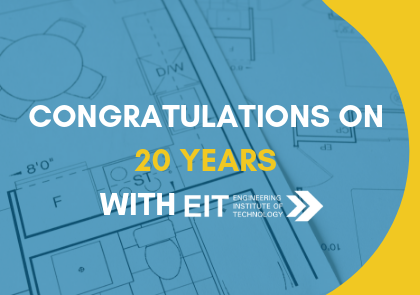
The company originally hosted 2-day public training courses, for professional development in engineering, around the United Kingdom, Ireland and the world. IDC instructors also went on-site to present the short courses - often customised for the client - and this still remains a vibrant part of the business today. To accompany the courses IDC published popular technical manuals.
Carol and Alison began in an age before social media so, in order to get the IDC word out to the engineering world, the marketing entailed direct mail. Delegates who were interested in registering for courses would have to send a paper booking form either by post or fax!
The arrival of the Internet set the stage for EIT: it was the advent of the company’s virtual classroom with live, interactive training and education dedicated to engineering and technology. Carol Moverley said:
“The creation of EIT marked a significant change in the IDC/EIT story. With the collapse of the financial markets in 2008 companies were all tightening their belts, so the creation of EIT gave companies an alternative to sending delegates away to attend public classroom-style training. It took a number of companies some time to recognise the benefits of live, interactive training, but as EIT gained international accreditation for more of its courses, more companies accepted this cutting edge way of providing training.”
As technology continued to develop and EIT began to gain more accreditation around the globe and with a growing number of courses and qualifications across the vocational and higher education sectors, the prospects for IDC/EIT began to gather steam. Alison Brown said:
“IDC/EIT feels like an ever-growing family. The work is varied: there are always new challenges and new technologies which keep the job fresh and exciting. The company is always moving forward with new developments, a couple of the newest – to offer an alternative to the online model - campuses in Perth and Melbourne, for engineering bachelor and master degrees.”
As the institution has developed so have Carol and Alison’s careers. The ease of modern communication has led to a flood of inquiries from individuals wanting to study and train through EIT - and Carol and Alison have been on the forefront of dealing with these prospective engineers. Carol and Alison know they are not the only ones learning; they are gratified to witness EIT students ably engaging in the new learning paradigm of online education. Alison notes:
“Engineers by nature have to learn new concepts and technologies in order to develop their careers and keep up with progress within the industry.”
Dean of Engineering and Founder at the Engineering Institute of Technology, Steve Mackay, lauded the two ladies:
“I congratulate Carol and Alison in our London office and thank them for their incredible service over these eventful 20 years. They are both extremely dedicated and enthusiastic and despite the years this has not waned. They have always risen to the challenge and found ways to navigate past the frequent obstacles. They are loyal and they are stalwarts - constantly looking for ways to improve our offerings despite the huge distances separating them from our head office in Australia.”
Alison and Carol note that their spare time is spent with family and friends. They also look forward to the holidays when they can kick their shoes off and put their feet up, but knowing that they have been integral players in the success of the Engineering Institute of Technology.
- Details
- Written by: James Mackay
Hi everyone,
A few weeks back we sent an email out to our students regarding their overall experiences with the Remote Labs. The feedback we received was extremely comprehensive; allowing us to identify and mitigate the primary points of confusions.
To subsequently amend this, we are rolling out a new version of the Remote Labs. The new version consists primarily of minor tweaks and fixes, but we have a few major updates listed below that you might like.
The new version will be rolled out over the next few days, so your experience with the labs may be slightly intermittent.
Connection Quality Indicator
A common setback of our institute's global reach is the inadequate connection speeds some of our students incur. Our development team has implemented a connection quality indicator will now appear next to the Timetable of labs in real-time. While TeamViewer generally provides a highly optimised experience when connecting to the labs, the connection indicator will provide some insight into how your session with the labs will be.
The various indicators consist of a green circle, yellow circle, and red circle (green being the best connection, and red being the worst). While it is a simplistic indicator, they do provide a relatively accurate understanding of your connection experience will be when connecting to the labs.

If you need to use a particular software, you can now pre-empt your lab experience by booking a lab with a better quality indicator.
Simplified and Secure Connection Experience
Another major improvement consists of the process from the Remote Lab platform to TeamViewer. You can now simply just click on the commence lab button, and the TeamViewer program will appear with the password.

Improvements with the security of the labs have also been made. Instead of a universal default password, you will have a unique password generated for your session. You need to copy that into the TeamViewer password popup to commence your session.
The below video will display the process:
The purpose of this is to ensure that another person can't accidentally enter the lab when it is not their time.
If you have any questions regarding this upgrade, please feel free to contact us via our Lab contact form, or contact your LSO.
- Details
- Written by: Edwina Ross
On Friday 23rd November the Perth team at the Engineering Institute of Technology was all dressed up and in celebration mode: we were delighted to be gathered to congratulate our 2018 Australian graduates.
A number of these clever people had convened, from all around Australia, and were also joined by Algate Mtemah, a student who had flown in from South Africa.
We not only celebrated the graduates themselves, their persistence and hard work, but also their incredible families and friends. It is their love and support which helps our online students through the gruelling hours of study, before or after their working days.
All of our students deserve recognition, but the Australian Graduate of the Year was ultimately awarded to Brian Lord. He graduated with an Advanced Diploma of Applied Electrical Engineering and this is what he said about it: “It was the ‘lightbulb’ that changed my electrical life and opened my mind.” He went on to ask, “…why a good portion of the study wasn’t taught to us at Electrical Trade school? It was highly relevant and would’ve opened my mind many years ago.” Despite being 53 years old he is filled with renewed confidence and looks forward to starting the BSc in Electrical Engineering.
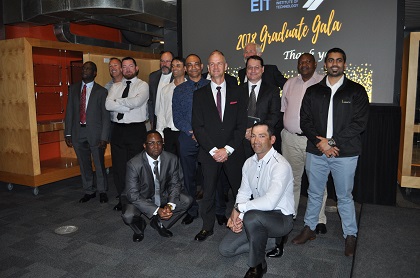
The graduates were addressed by a number of speakers. The Dean of Engineering at EIT, Dr Steve Mackay, reminded them to hone their communication skills and keep abreast of developments in their fields.
Mr Ron Manners, Chairman of the Mannwest Group and the Mannkal Economic Education Foundation, has life and business experiences which are legendary. He encouraged the students to always find perspective; he reflected on our ability to smile at our earnest endeavours when we look back.
The students also heard from Mr Cameron Norsworthy who spoke of ‘flow’- those moments when work flows efficiently and effectively, free of interfering doubts. He conceded that being well-prepared was a prerequisite.
One of our lecturers, Partha Dev, pointed out that despite their dedication and love for all things technical, engineers need to nurture their emotional intelligence - a critical asset in all our professional and personal lives.
Finally, Engineers Australia was ably represented by Mr Paul Young, President elect of the Western Australian division. His experiences in the engineering trenches proved valuable to the students.
It was a lovely evening celebrated at the newly opened EIT campus in East Perth. And it was fitting, therefore, to welcome some of our on-campus students to the event, to help us congratulate the graduates. Two of our young students were then surprised to receive awards for excellence, Victor Onoja and Binod Tamang, studying towards their Bachelor and Master degrees respectively.
Congratulations to all our EIT graduates, wherever you are based, and thank you for selecting to study through EIT. Please keep in touch with us - let us know what you are up to and how you are faring in your engineering careers.
- Details
- Written by: Edwina Ross
At TEQSA’s third annual conference in Melbourne, at the end of November, Dr Steve Mackay presented a paper on the Development of a Career Advisory Site; it summarised his research to date - applying machine learning techniques to millions of job adverts around the world. Caroline Patterson also attended the conference and interacted vigorously at the QA Online Learning Forum.
Despite the software still being in its infancy, Steve’s presentation (his latest project) involves the creation of a site which is able to collate and update real time job postings.
He believes it will have varied applications, but trusts it will also provide education regulators, including TEQSA and ASQA, with an objective means of measuring and assessing the value of proposed courses - courses that are currently relevant in the marketplace and courses which will enable graduates find work in their fields of study.
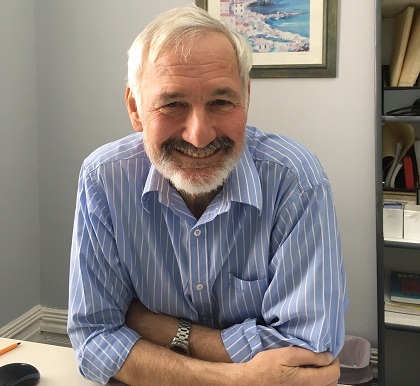
With the chatter about jobs being hollowed out, in an age when technologies are changing rapidly, Steve also anticipates the site becoming a useful guide to students, and indeed to those already working. It will provide them with an idea of the existing and emerging job opportunities wherever they live in the world.
The reputable marketing analytics company, Burning Glass, estimates that up to 85% of jobs are now posted online. It was this statistic which spurred Steve on. He realised that sophisticated ‘web spidering’ and machine learning techniques had the capacity to access up-to-date job information, for each key location in the world, and provide a real time source of data.
He has used the ubiquitous Python language, with its machine learning libraries, to classify the huge array of engineering and technology job data.
Natural language processing was then used to identify specific skill and knowledge requirements. This has been useful in summarising what a specific job requires in one city versus the same job, but with different requirements, in other cities.
Then, to ensure readability, Steve used a simple dashboard to include the job title, occupation details, proposed salary, the employer and the location. This will be released in a full online version in late December 2018.
In our modern world immediacy and convenience are expected. This career advisory site will tick both boxes for educators, regulators, would-be students, graduates, job seekers and those looking for a career change. They will have - at their fingertips - access to current information on job vacancies, across the different disciplines, worldwide.
- Details
- Written by: Edwina Ross
Are you planning to study towards a degree with EIT during 2019?
Our 2018 scholarship winners - students online and on-campus - are working hard, making the most of the windfall they received.
If you plan to study with us next year you should consider sending in your application very soon.

- If your preference is online study you need to be quick! You must have your scholarship application in by Friday 23rd of November, 2018.
- For those of you planning to study on-campus, you must have your scholarship application in by Friday 11th January, 2019.
How to apply?
Please see our Scholarship Page for eligibility criteria and application requirements.
Please contact Ms Caroline Mackay on
- Details
- Written by: Quintus Potgieter
On the 18th October the Engineering Institute of Technology (EIT) hosted their 2018 African Graduation Gala, in South Africa.
Almost 60 graduates attended; having completed either a Master of Engineering degree or an Advanced Diploma, and in a couple of instances, a Professional Certificate course.
Despite the tyranny of distance, the EIT graduates who were able to attend hailed from ten African nations: Chad, Ethiopia, Uganda, Tanzania, Botswana, Namibia, Zambia, Zimbabwe, Angola and South Africa.
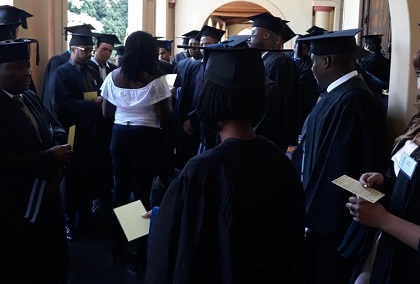
The live, online platform of learning reaches EIT students in their homelands around Africa (and indeed the world). The graduates’ discipline, persistence and determination were applauded; the vast majority of them have studied while working full time.
The 2018 graduates were addressed by the CEO of the South African Council of Engineering (ECSA), Mr Sipho Madonsela and Mr Johan Maartens, the CEO of the Society for Automation, Instrumentation, Measurement and Control (SAIMC).
Both gentlemen expressed their support for an education which contributes to the betterment of the learners and to the industries in which they work. They also exhorted the graduates to continue to learn and to remain abreast of ever-changing technologies, in an age marked by the Fourth Industrial Revolution.
Addressing the graduates at the ceremony, CEO of ECSA, Mr Madonsela said:
“You are party to a revolution whether by commission or omission which is enhancing engineering didactics on the concept of technology. Not only have you been equipped with the means to transform the natural world, you yourselves have been through a process that is transforming the deployment of technology in engineering education.”
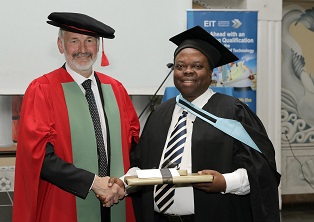
The graduation ceremony, in quintessential South African fashion, included ululations and jovial celebrations.
The Dean of Engineering at EIT, Dr Steve Mackay, honoured some of the college’s most dedicated students and urged them all to maintain their integrity; even when it required them to choose the more difficult path.
The Graduate of the Year, Johannes Kapeuasha, joined the proceedings via webcam from Namibia; he spoke admiringly about how EIT had contributed to his promotion from security guard to industrial security technician.
One of the runners-up is a future female engineering superstar, Jo-Ann Hogan. She commented that there were times during her course when she thought she would not finish; her excitement for what the future holds was plain.
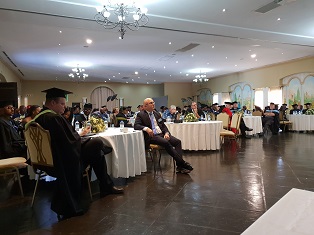
The EIT Honorary Student of the Year is a Zimbabwean student, Algate Panyika Mtemah. Algate, amidst Zimbabwe’s politically complicated year, assisted students with transferring money from Zimbabwe to South Africa to pay for their tuition fees.
The day ended with a lunch and a networking opportunity for the many proud graduates and family members who attended.
- Details
- Written by: Elyse Simich
EIT alumnus Allan Butler conducted a presentation on “Ethics in Engineering” for our students at our East Perth campus last Thursday.
Allan, who is currently a SCADA Engineer at Australian Gas Infrastructure Group, graduated from EIT’s Master of Engineering (Industrial Automation) in 2018. His main role is to manage the SCADA system at the Dampier Bunbury Pipeline.
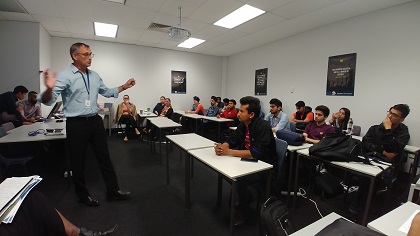
EIT is committed to delivering education programs that are aligned with real industry needs. We also want our students to have ongoing access to relevant information, so they can continue learning and improving well into their career. As a result, we’re collaborating closely with industry to bring our students relevant guest speakers who can provide meaningful technical insight.
With over 20 years of experience in the engineering industry, Allan was able to share his advice about life beyond the classroom.
His presentation started with a question: “Would you rather take a 50% chance of getting the problem correct and $1 million, or a 99% chance of getting the problem correct and $10?
“If you said 50% and $1 million, you can stand and leave.”
With a focus on ethical decision making throughout an engineer’s career, Allan then talked about avoiding disaster when a project goes wrong.
“The only way to remove any uncertainty is to remove the doubt,” he said.
“As an engineer your ability to question and simplify the most complex and critical issues you face will prevent a disaster.”
He encouraged the students to own their signature and warned against signing off on a project if they’re not completely certain there are no problems with it. He reminded them that the public puts their faith in the engineers’ abilities to keep them safe. For example, most people don’t expect structures such as bridges and buildings to collapse at any moment.
“Your signature is your word that you have agreed with a statement of engineering fact. Time, money and ignorance is not an excuse for signing off on poor design or recommendation.”
He also emphasized the importance of taking control of your own educational experience.
“Your lecturer gives you a series of questions followed by examples and maybe the answers. Your lecturer is only responsible for half of your experience.
“Your job is to help yourself and your class mates. The question you ask is possibly the one everyone else was considering.”
To listen to the recording, click here.
- Details
- Written by: Steve Mackay
The Engineering Institute of Technology (EIT) is pleased to announce that from 03 September 2018, a new application system will be made available to allow interested students to apply online for their course or program of choice.
The implementation of this new online system will make it easier for interested parties to apply to study with EIT and to be kept informed of the status of their application.
We strongly recommend that you contact our qualified Course Advisors before lodging an application so we can counsel you on the suitability of the course and the application requirements. Simply complete the request form on the relevant program page and we will get in touch with you to assist you.
We look forward to receiving your online application to study with EIT in order to help you advance your career!
If you need any assistance, please do not hesitate to contact us:
- Details
- Written by: Ruth Kennedy
Industry Presentation: Innovation by Digitalisation – The future of Power Generation and what skills do engineers need to realise it?
Join our distinguished guest speaker Robert Ceic for an insightful presentation at our Perth campus on 24th of May 2018 or follow it online!
To receive more information about this presentation, including online streaming details, please complete the form available on this page.
EIT is committed to delivering education programs that are aligned with real industry needs. We also want you to have ongoing access to relevant information that will make you a better professional and will help you improve the quality of your life and of those around you. As a result, EIT is collaborating closely with industry to bring you relevant guest speakers who can provide meaningful technical insights – an invaluable benefit!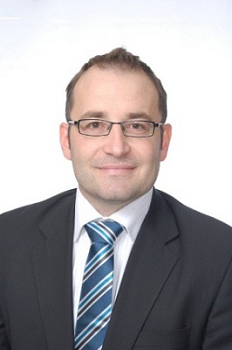
We are honoured to have Robert Ceic as part of EIT’s Distinguished Industry Guest Speaker Program sharing some of the knowledge he has gained over two decades of experience in the power industry.
Robert is Technical Director and Australian Service Line Leader for Power Generation & Renewable Energy at GHD based in Perth. He has the primary corporate responsibility for developing and maintaining GHD’s technical capabilities.
He has over 22 years of experience in the power industry as a contractor and consultant ranging from project development and design through to construction and operation of various types of power generation facilities in Australia, United Kingdom, United States and Indonesia.
Robert is a Chartered Mechanical Engineer with postgraduate qualifications in Management and a Fellow of the Australian Institute of Energy.
The presentation will take place at our Perth Campus (140 Royal Street, East Perth) on Thursday May 24, 2018 at 2:00pm, followed by refreshments and networking opportunities. We encourage you to join us in person for this unique opportunity. We will also stream the presentation online in real time and make the recording available.
The presentation will cover the following aspects:
• Current transformation of the Australian power industry - the shift from fossil fuels to renewable energy sources, changing power networks and the disruptive technological forces that are assisting this transition
• The increasing digitalisation of power generation technologies and processes – big data, virtual reality, IoT, 3D printing
• Evolution! The engineering professional will [have to] "evolve" in order to effectively define future technical solutions.
• Revolution? New technologies will be so disruptive that they are going to revolutionise the way engineering is executed and educated.
To receive more information about this presentation, including online streaming details, please complete the form available on this page.
To find out about EIT’s Distinguished Industry Guest Speaker Program or become a part of it, please contact Mrs Carolina Asenjo (
{uniform form=99/}
- Details
- Written by: Ruth Kennedy
Are you interested in expanding your professional network globally and speaking to outstanding engineering students and graduates about your incredible engineering career?
By joining our Distinguished Industry Guest Speaker Program you will have the unique opportunity to share your technical insights and engineering experiences with our engineering bachelor and master students located at our East Perth campus. Your presentation can also be streamed to EIT’s 500,000+ followers around the world. It is an opportunity to raise your professional profile and keep your finger on the industry pulse nationally and internationally.
We are determined to expose our wonderful engineering students to engineering professionals such as yourselves so that they get a practical and useful engineering education.
Interacting with our enthusiastic students will give you and your company the chance to connect with the next generation of engineers and technicians and learn more about their practical projects and possible areas of collaboration.
An honorarium will be paid for your valuable contribution and you can also gain full access to our digital library of technical resources. We are particularly interested in professionals with industry experience in any of the following engineering areas: Industrial Automation, Electrical, Mechanical, Civil and Structural. To find out more, please contact Carolina Asenjo (
- Details
- Written by: James Mackay
A Moodle Upgrade is Inbound...

The Engineering Institute of Technology has been in the works of implementing a new and improved Moodle LMS.
Here at EIT, we work diligently to ensure that we comply with the latest web standards available on the market. We’re dedicated to providing anonymity for all our students’ data, and ensuring that everyone has a comfortable experience when interacting with Moodle.
We are in the works of upgrading our current LMS, which will yield numerous benefits for all our students once implemented.
How Does this Impact Me?
As we endeavour to perform the upgrade, we’ll be forced to take Moodle offline for the weekend. This is a requirement of the upgrade, as the server will be under significant stress throughout this time. It also ensures that we mitigate any potential data corruption that could occur.
We highly recommend students download all the relevant materials they intended to use throughout the course of the weekend, as they won’t be accessible from Friday the 2nd of March at lunch time.
When we have completed the upgrade, we will then send an email out informing them of the status. We then urge all students to check that everything is in working order, as that will assist staff with cracking down on any potential errors or gaps.
2018 March Timeline:
- 2nd Friday: Moodle will go down at lunch time.
- 3rd Saturday - 4th Sunday: Upgrade in progress.
- 5th Monday Moodle will be live and useable again.
We’re undertaking this upgrade to enhance the experience of our students; therefore we thoroughly appreciate everyone's patience with this endeavour.
What is the Purpose of the Upgrade?
Theme
We have implemented an overhaul of the current platform, ensuring that our Moodle complies with the modern UI standards. The aesthetics of the platform attempt to focus the content relevant to you, highlighting any important updates or links that are presented by the LSO’s.
Functionally, the new look endeavours to reduce overall load speeds, and reacts well when accessing the platform on a mobile device.
Don’t panic though, as the primary navigation around the site platform has not changed all that much.
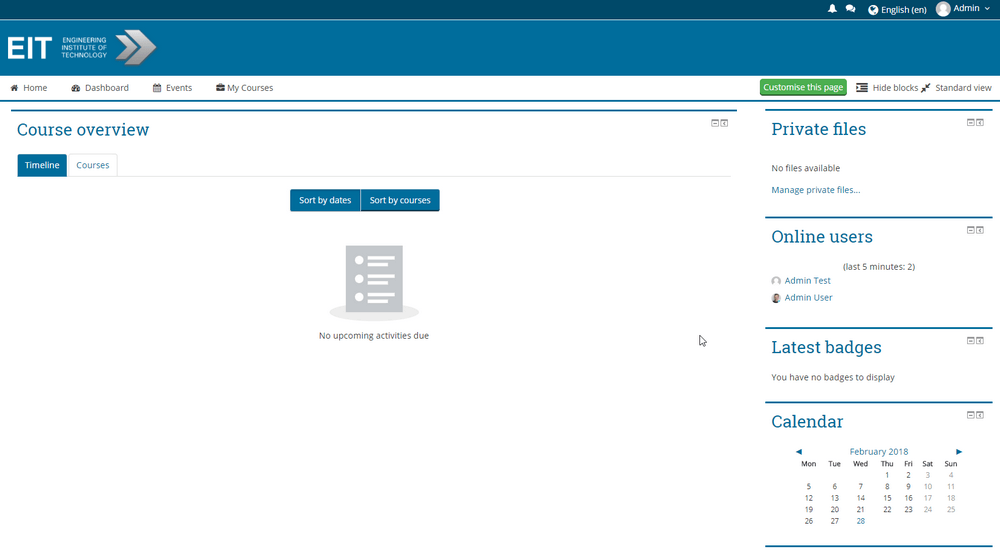
Security

We’ve noticed some minor security issues starting to appear on the platform; which has prompted us to move forward with the system. The new Moodle upgrade will facilitate the most up to date security features, ensuring that the data and course work of our students is protected.
Security of our students is our top priority at EIT. We will stop at nothing to ensure total anonymity of sensitive data, and protection against malicious attacks external to the platform.
- Details
- Written by: Steve Mackay
A speech to EIT students embarking on their studies: February 2018
Good morning Ladies and Gentleman
As I stand in front of you I am sure you are contemplating the years stretching ahead with a mixture of excitement and apprehension; wondering what they will bring you. To come to a strange country and to commit to this challenge is brave, well done! We would like to welcome you warmly to our college.
There are four things I would like to talk about today:
- Our proud history
- The Ethos of the Engineering Institute of Technology
- Why attending college is a great decision
- Some suggestions and points to take-away with you
Our Proud History
We were founded in 1992 so have a proud history extending over 27 years. During that time we have trained over half a million engineering professionals on our short courses and currently, on our online engineering diploma and degree programs, we have around 1500 students based in over 140 countries. We also have corporate clients who use our training and education, smaller firms and blue chip companies such as BP, NASA, Rolls Royce, the US Army, BHP Billiton and Rio Tinto.
Our focus and passion is engineering and technology; we love nothing more than demonstrated excellence in these areas. But we realise too that it is essential to communicate well and to develop an understanding and admiration for the Arts and Philosophy. I believe a well-rounded, positive individual who is open to learning will get the most out of Life.
The Ethos of the Engineering Institute of Technology
EIT is unique and markedly different to other institutions and this is why:
- We are a college which is 100% devoted to engineering and technology;
- We have highly experienced and dedicated engineers and technologists lecturing for us;
- We keep our class sizes small because we want to ensure your success;
- We aim to educate individuals - not just a group – because we are interested in each of you;
- Whilst we undoubtedly undertaken research; we are 100% focussed on excellence in teaching and learning unlike most of other institutions who have to compromise;
- We have incorporated online education into your classroom to expose you to international engineering expertise and the modern 21st Century world;
- We will ensure you receive practical, useful and cutting-edge content to better prepare you for work and a career in engineering (Our 1500 students are, by and large, working in industry in well-paying jobs);
- We have worldwide accreditation and endorsements for our programs;
- We have extensive opportunities for professional development and life-long learning (for well after you finish your degree with us);
- We are flexible and nimble; we continuously improve our content to keep up with the changes in industry and we regularly add new topics to our array of courses and qualifications.
You may wonder if you have made a good decision – is a college qualification worthwhile?
I believe the answer is a resounding ‘YES’ (But then, as Dean of your college, with a few degrees behind my name, I would have to say that wouldn’t I?)
Despite this, your decision is an intelligent one; it will most certainly hold you in very good stead. At college you have the opportunity to learn, to acquire new knowledge and skills. This is a privilege, but it is also designed to help prepare you for your career, or to boost it. (Studies clearly indicate that college graduates earn more than those who choose not to attend.)
You will also make new friends – both here and out there in Perth and beyond. This is important for you personally (and potentially for future networking).
I would urge you to do your very best while you are here. Stretch yourselves, work hard and use all your experiences, socially and academically, to help you fulfil your potential and your dreams.
Some suggestions
Australia
Australia is a marvellous country populated by a wonderful mix of cosmopolitan people. Most of us are immigrants, originally from another part of the world. Australians love to give everyone a ‘fair go’; they love sport and the ‘larrikin’ spirit. It is also a highly regulated country – as you would have discovered already through your visa process. Thanks to this careful regulation and a strong social awareness you will notice that crime is low here – it still happens, but it is low. It is a very positive caring environment in which to live. You may, however, find the socialist ideals difficult to adjust to. Or you may love them. Naturally, as is the case in every society, there are those who hate the systems and structures; all we can do is to remain positive in the face of their anger.
Think Globally
We live in a global village. If you owned the corner fish and chip shop, for example, the price of potatoes in another country could force your costs up (or indeed allow you to lower them). There are many factors which impact us as global citizens: climate change, sustainability, the cost of energy and pollution. Your engineering career should be thought of in exactly the same way. You will be capable of working anywhere in the world; in fact the company you ultimately work for will, more than likely, have international partners in other countries.
STEEM Ahead
Recently I was sharply corrected by a good engineering colleague of mine when I used the term STEM (Science, Technology, Engineering and Maths). He suggested an improved acronym: STEEM – to include entrepreneurship. And he is absolutely right.
The evidence of a rapidly changing jobs market is clear. A ‘job for life’ is no longer an option and increasingly automation is hollowing out traditional employment in many industrial facilities. Technologies that once were buzzwords are now being successfully implemented and providing huge opportunities for would-be entrepreneurs: machine learning, artificial intelligence, robotics, the Internet of Things, cybersecurity, cloud computing and virtual reality.
These changes make it critical that we all become entrepreneurs; we need to learn to think as entrepreneurs, to focus on creativity and business outcomes. And in this we also need to tolerate failure and learn from it. It doesn’t mean that you should set up a business, but that you should always think of yourself as an entrepreneur — even when working within a large company.
Learning is Life-Long
Rapidly changing technologies mean that acquired information loses its relevance and applicability more quickly than ever before. This can be daunting and slightly disheartening, but it needn’t be. Be open to learning. Formal education is one thing, but informal learning is often more powerful. You may recall in times gone past the very powerful learning models with the master craftswoman training her apprentice to be an outstanding professional. Similarly, you will find expertise available informally which you can draw on and make your own. Traditional college and vocational education will be unrecognisable in the next decade with the incredible opportunities presented by the internet and training companies arriving on the scene.
Take Responsibility for your Learning
Up until this point most of you would have had a largely structured education. At college you will find it less so. Yes, we have the clear learning objectives for each unit, but we want you to go well beyond these goals, we want you to reach for the stars. You will be expected to become self-reliant and independent in your thinking and learning. Develop good study habits, work hard and be disciplined in your approach to your education. Learning without rigour and merely hoping for the best is a sure fire recipe for failure. Talk to us if you find topics difficult; don’t wait until it is too late. We are determined that you succeed. You are extraordinarily important to us.
Critical Thinking
Colleges and Universities encourage critical thinking and debate because education is not about indoctrination. I have encouraged you to be structured in your approach to your studies, but be cautious; don’t develop a fixed mind set. It is vital that you question everything that you are taught. We will undoubtedly stretch you in your thinking and work here. Bear in mind that some of the most successful technologists in the world dropped out of their studies - luminaries like Bill Gates, Steve Jobs, Elon Musk and our mentor, until his recent death, Dick Morley – who founded a trillion dollar automation business.
You Never Arrive
Please always remember that it is the journey that is important, not some envisioned destination. Enjoy each day; draw maximum value from every one of them and contribute your absolute best. Try and support your fellow travellers on the journey – whilst we are looking for individual effort – you will personally gain enormously by helping others. We look forward to accompanying you on your journey.
All the best for a barnstorming 2018. Focus on hard objectives now to ensure your time here exceeds all your expectations. Above all, stay healthy and stay personally connected.
On behalf of us all I wish you the heartiest of welcomes to the Engineering Institute of Technology.
Steve Mackay PhD
Dean of Engineering
- Details
- Written by: Edwina Ross
EIT is proud to announce that six of our Online Engineering degrees have been provisionally accredited by Engineers Australia under the Sydney and Washington accords.
- Online BSc degrees in Mechanical, Electrical, Civil and Automation Engineering under the Sydney accord, and
- Online Engineering Master degrees in Industrial Automation and Electrical Systems under the Washington accord.
This means these EIT degrees are now internationally recognized under the International Engineering Alliance (IEA) accords and the various signatories (http://www.ieagreements.org/accords/washington/signatories/).
EIT students can study these courses online, anywhere in the world and receive an Australian Qualification accredited and endorsed by the Australian government, as well as Engineers Australia.
This provisional accreditation is conditionally accorded and applicable to students enrolled in these online courses from 2017 onward. EIT will be applying to Engineers Australia for approval of the campus-based offerings of these same courses in 2018.
With this accreditation in place, the quality and standard of EIT’s degrees are undoubtedly world class.
To view our training schedule, please visit: http://www.eit.edu.au/cms/schedule.
- Details
- Written by: Allison
The New Generation for Engineering Education!
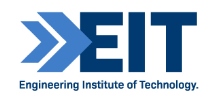
We have two FREE sessions coming up in November and we would love for you to join us if you are contemplating studying either online or on-campus to help advance your engineering career.
The first session is our Sundowner Info Session held at our new East Perth Campus on November 23. The second session is being held in Melbourne on November 30; join two passionate engineers with over 40 years of industry experience talk about the Engineering Jobs of the Future!
- Details
- Written by: Super User
It is time to plan your reward for all the hard work you have put into your studies with the Engineering Institute of Technology!
You spoke and we listened!
Due to popular demand we will have two Graduate Galas in 2018:
- Midrand, South Africa: 18th of October 2018
- Perth, Australia: 23rd of November 2018
We are excited to celebrate our graduates during two very special events in the vibrant locations of Perth (Australia) and Midrand (South Africa). These will be memorable gatherings with the unique opportunity to receive your Diploma and a special token of appreciation directly from the hands of EIT’s Dean of Engineering, Dr Steve Mackay.
You will be able to meet our College Managers, some of our wonderful Learning Support Officers and Lecturers who assisted you in your studies and hear from inspirational speakers. Read more below and do not miss the opportunity to apply for the Graduate of the Year Award.
If you would like to attend an EIT Graduate Gala, please make sure you complete the form available on this webpage indicating your location preference.
Australian Graduate Gala
EVENT DETAILS
- Date: Friday 23rd of November 2018
- Time: 6:00pm to 8:30pm. Arrival by 5:30pm for prompt start
- Location: Green Building EIT Campus - 140 Royal Street, East Perth, Western Australia
- Dress code: Cocktail Attire
- Cost: Complimentary for all EIT graduates
- Accommodation: if you require accommodation in Perth you can contact the event coordinator, Carolina Asenjo, to find out about possible discount options for EIT graduates
- Tourism activities: Perth and the whole of Western Australia have plenty to offer visitors and the time of the year will provide fantastic weather to wonder around the many parks, beaches and natural reserves, among other attractions. You can find out more with the Tourism Department of Western Australia, Expedia or Bookme
- Valid Visitor Visa or Passport: You may need a valid visa/passport to allow you to come to Australia for this event. The Australian Department of Immigration and Border Protection has a very detailed website you can visit for more information: https://www.border.gov.au/.
- Event Coordinator: Carolina Asenjo,
This email address is being protected from spambots. You need JavaScript enabled to view it.
SPEAKERS
Mr Ron Manners
His long career has taken him to a number of major world events such as the fall of the Berlin Wall, the collapse of communism in Russia and the Hong Kong handover. Mining is in Ron’s blood. He started out as an electrical engineer, training at Kalgoorlie School of Mines, and took over the family business in 1955. The mining industry has seen a number of changes in the past 60 years, such as the introduction of new technologies, and Ron has weathered this with humility, enthusiasm and good humour. As a proponent of the free market model, Ron set up Mannkal Economic Education Foundation, a think-tank that sponsors students and events. Ron is also a book author, including titles such as Poems of Passion, Heroic Misadventures, and Never a Dull Moment.
Mr Cameron Norsworthy
Cam is a coach, entrepreneur, author and speaker. He focuses on integrated coaching techniques that encourage sustainable transformations and rewards and has coached numerous World Champions, executives, entrepreneurs, and high profile military personnel. In 2013, Cameron founded The Flow Centre to align his training and passions and put Flow in the public eye.
Mr Partha Dev
Partha has 30 years of Civil Structural Engineering & Management experience in the oil and gas sector. He has worked on major capital projects involving fixed and floating offshore structures, onshore hydrocarbon, LNG facilities, power, mining and infrastructure assets and is known in the industry for his ground-breaking work in structural reliability assessment. Partha is passionate about mentoring students and professionals. He is also an adept problem solver and received the coveted E. Paul Torrance Australian Coach’s award from the Future Problem Solving Program committee in 2017.
South African Graduate Gala
EVENT DETAILS
- Date: Thursday 18th of October 2018
- Time: 11:00am to 1:00pm
- Location: Midrand Conference Centre, Midrand, Johannesburg
- Dress code: Cocktail Attire. Graduation Gowns can be hired. Specific hood colours apply per School.
- Cost: Complimentary for all EIT graduates. Additional guests can attend by paying R345 each
- Accommodation: if you require accommodation in Midrand you can contact the event coordinator to find out about possible discount options for EIT graduates
- Tourism activities: Johannesburg in South Africa is the second largest city in Africa, Joburg, or Jozi as some prefer to call it, offers visitors an experience as unique and diverse as the city itself and the surrounding areas. Browse through the multitude of wonderful attractions and things to do in Gauteng as well as a dazzling array of options for everything from accommodation to car rental, restaurants, shopping and casinos, etc. https://www.gauteng.net/ https://www.joburgtourism.com/tourist-information
- Valid Visitor Visa or Passport: You may need a valid visa/passport to allow you to come South Africa. Please visit the South African Home Affairs Department for more information: https://www.dha.gov.za/
- Event Coordinator: Apolonia Pamuri,
This email address is being protected from spambots. You need JavaScript enabled to view it.
SPEAKERS
Mr Terry Cousins
Terry has over 30 years of experience in electrical power and distribution systems in various South African industries. He is currently a director of TLC Engineering Solutions who develops instrumentation and measurement systems for industry. He also presents courses on electrical power distribution and power quality. Terry is a Senior Member of the SAIEE, and a Member of the IEEE (USA) and has also served on the South African National Standards committee for power quality instruments (SANS 1816).
Mr Deon Reynders
Deon is an Electronics Engineer with over 40 years postgraduate experience encompassing middle management, engineering consulting, management consulting, hardware and software development, systems engineering, project management, marketing, and industrial relations. Over the past 15 years he has provided consulting and training services to clients in USA, Canada, Ireland, the UK, South Africa, Botswana, Trinidad, Australia, New Zealand, Indonesia, Singapore, Malaysia, Thailand, Malaysia, Myanmar, Saudi Arabia, Oman and Egypt. He is also co-author of several technical books.
Mr Tom Neillings
Tom started his career as an engine fitter in the RAF. After leaving the RAF he worked in oil and gas North Sea projects. During this period he gained valuable experience and knowledge of diesel power generating systems operating in harsh environments. Tom continued his career in South Africa with a short period in Saudi Arabia. Tom's down-to-earth and practical, yet entertaining approach makes him a sought after speaker and instructor. His enthusiastic approach to training coupled with his helpful nature is guaranteed to maximize the learning outcome for his students.
EIT Graduate of the Year Application
Applications Open
This is your opportunity to gain the ultimate feather in your cap. Complete the application form available here http://www.eit.edu.au/downloads/2018_EIT_Graduate_of_the_Year_Application_PDF_Form.pdf and send it to Carolina Asenjo (
The winner will receive:
- A complimentary place on an EIT Professional Certificate of your choice. The course must have enough paying students to go ahead and must be completed by December 31, 2019
- A write-up of your achievement in EIT’s website, social media platforms and eNewsletter which is circulated to over half a million engineering professionals worldwide
- Electronic access to the complete IDC Technologies electronic library of technical manuals for 1 year
- An Acer tablet (or equivalent gift) valued at $250 r.r.p.
- Commendation at the Graduate Gala ceremony
All finalists will also receive a prize for their achievement.
Do not miss this unique opportunity to celebrate your academic achievement, network with key industry contacts, and enjoy a beautiful location



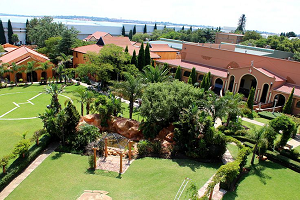


REGISTER YOUR INTEREST FOR THE 2018 EIT GRADUATE GALA
{uniform form=83/}
- Details
- Written by: Evangeline Newby
In memoriam: Roy Lunn - Automotive Engineering Extraordinaire
It must be one of the most rewarding industries in engineering. Many aspiring engineers in their youth dream of achieving a career in the industry. It entails an amalgamation of engineering disciplines coming together in the design and manufacture of a roaring, road-eating machine.
Automotive engineering incorporates mechanical, electrical, electronic, software and safety engineering. It has given rise to the hobbyists, the racing professionals, and the businessmen. And the industry has just lost one of its stars.

Image: The iconic Ford GT40
Credit: Top Gear
Roy Lunn is one of Ford’s most celebrated engineers. He passed away on the 5th of August 2017 at the age of 92. Originally from Britain, he started his career by obtaining degrees in mechanical and aeronautical engineering at Kingston Technical College, where after he became a pilot in the Royal Air Force. At the end of World War 2, he began his career in automotive engineering. He took his hobby of racing sports cars and made it his career. And what a career it was.
Roy worked for AC Cars in 1946, moved to Aston Martin and worked there from 1947- 49 (where he got his first taste for the Le Mans race) and then moved over to Jowett Cars. In 1953, he joined Ford of England. He was an engineer and product-planning manager for the Ford Motor Company in the United States by 1958. He worked in a department known as the Ford Advanced Concepts Group.

Automotive Hall of Fame Inductee
Roy Lunn was inducted into the Automotive Hall of Fame in 2016. It was on the 50th anniversary of Ford Motor Company’s 1-2-3 finish at the 1966 iteration of the 24 Hours Le Mans race. Roy worked on the GT40 project that led to the undoing of Ferrari’s dominance in the Le Mans race. Ford went on to win the Le Mans race four more times after ‘66.
He didn’t stop there. Lunn contributed to Ford’s most iconic, most recognizable car, The Mustang. Lunn worked on the design team that engineered the 1970 BOSS 429 Mustang. He had had a hand in the design of the Mustang many years before that as well.
He also worked on the presidential limousine for President Nixon and used his engineering background in turbines to produce a gas-turbine-powered 18-wheeler long-distance vehicle, named ‘Big Red’.
Later on in his career, he slowed down a little, but led teams that would manufacture consumer cars. In 1983 he led a team at American Motors Corporation that birthed the Jeep Cherokee. Lunn became the technical director of Jeep and paved the way for the SUVs we know today. Under Roy Lunn, the automotive world saw the first unibody, four-wheel-drive SUV.
For his work on that Cherokee Lunn is today considered the forefather (and ‘Godfather’), of the SUV. The car went on to sell 3 million units, and according to Autoweek, was the first American-branded vehicle to outsource its manufacturing to China.
The future
Towards the end of his life, Lunn began driving a Toyota Prius in a bid to embrace the future of automotive engineering. He also dreamed of contributing to the future of sustainable and clean automotive engineering. According to the New York Times, Lunn began developing a three-wheeled electric vehicle, built out of completely sustainable materials and costing $5,000.
 In 2008, Lunn published a book, ‘Globalization - A Worldwide Quest for A Sustainable Future’. Showing that he truly cared for the earth’s future.
In 2008, Lunn published a book, ‘Globalization - A Worldwide Quest for A Sustainable Future’. Showing that he truly cared for the earth’s future.
Connecting the dots of Roy Lunn’s impact on automotive engineering reveals how influential his presence was to the industry throughout his life. And as automotive engineers endeavor to follow in the footsteps of inspiring Roy Lunn, his influence will stretch into the future too.
Works Cited
"'Godfather of the Ford GT40' Roy Lunn: 1925-2017." Autoweek. Web. 23 Aug. 2017.
"Roy Lunn, Pioneering Engineer of Celebrated Cars, Dies at 92." The New York Times. The New York Times, 18 Aug. 2017. Web. 23 Aug. 2017.
- Details
- Written by: Edwina Ross
We are happy to announce that our 4 Bachelor of Science programs have been approved for on-campus delivery. Students are now able to apply for an International Student Visa to study at our Perth, Western Australian campus.
The Engineering Institute of Technology (EIT) is the only college dedicated to the fields of engineering and technology, and ultimately to your success in learning
Our campus is in Perth, the sunny and friendly capital city of Western Australia, and we would like to invite you to study here with us.
We are very proud to offer you one of our four Bachelor of Science degrees in engineering. They cover the important disciplines of Mechanical, Civil and Structural, Industrial Automation and Electrical. And for those students who have already graduated with a Bachelor degree we have the Master of Engineering (Industrial Automation) - a growing and vital field of work in the world today.
Our programs are inspired by industry because they are designed and presented by an international cohort of experienced engineers. We continuously improve our content to ensure it remains on the cutting-edge of engineering endeavour. And to further prepare you for the workplace and enhance your learning experience we have a dynamic and modern approach to the practical components of the programs.
Western Australia is an exciting state for the practice of engineering because it is rich in resources, has a growing renewable energy focus, a vast range of agriculture, investment in infrastructure and is engaged in varied and robust automation projects.
Perth itself is a beautiful and clean city without being overly crowded. The beaches are magnificent and everyone, both the locals and visitors, love the weather.
For cricket enthusiasts, our EIT campus in East Perth is on the doorstep of the WACA and also a few steps away from the free city busses.
If you are looking for an adventure overseas and a world class qualification in engineering please contact us at
- Details
- Written by: Quintus Potgieter
After eight years of invaluable service Professor Darrell Fisher attended his final EIT Governance Board meeting on the 28th February 2017.
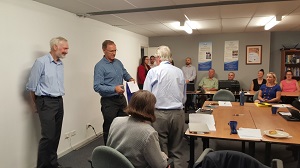
The Board Chairman, Colin Aitken, presenting Professor Darrell Fisher with a farewell gift.
He has built up an enviable reputation in science and engineering education throughout the world and during his long and distinguished academic career. His was the former Deputy Director of Curtin University’s world renowned Science and Mathematics Centre. His major research interests included classroom and school environments and curriculum evaluation, specifically in science. He has published and presented on these topics around the world.
He is a Fellow of the Australian College of Education and the Regional Editor for Asia and Australia for Learning Environments Research: An International Journal. He is a world leader in learning environment research and co-author of the recent book published by World Scientific, Technology-rich Learning Environments: A Future Perspective. Remarkably, Darrell has supervised over a hundred national and international doctoral students through his eminent career.
Darrell presided over a period of strong growth for the Engineering Institute of Technology. The college began with a couple of hundred diploma students and has expanded to our current student body, numbering over 1500, undertaking diplomas through to bachelor and master degrees, in all engineering disciplines.
His uncompromising integrity and passion for science, technology and engineering education has been invaluable to us at EIT. His unswerving commitment to ensure his students achieved their full potential has been the basis for his involvement on our Governance Board and we have truly benefited from this approach. We are deeply grateful to Darrell and will ensure he keeps his promise: to stay in touch and keep an eye on us.
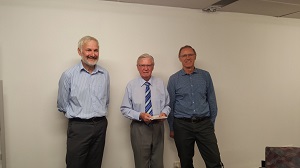
Dean of EIT, Professor Darrell Fisher and Chairman of the EIT’s Governance Board
- Details
- Written by: Sharne
At EIT we are blessed with an international group of extremely professional, experienced , knowledgeable lecturers who set us apart from other institutions. In a bid to recognise and reward excellence in teaching and professional training by recognising the top three lecturers who go above and beyond the standard requirements of the position, we introduced the annual Award for Excellence in Teaching and Professional Training.
Every EIT lecturer was assess against a predetermined set of criteria which included student and employer satisfaction ratings, responsiveness, participation in scholarly activities, contribution to content and levels of student support.
After a long deliberation process we are happy to announce the winner of the 2016 Award for Excellence in Teaching and Professional Training is Deepak Pais.
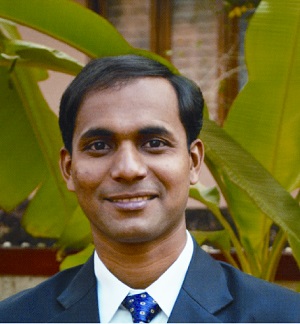
Deepak started his career within the Zinc mining & smelting industry as Project Engineer in Substation & Distribution Greenfield project. He then worked in a Marine and Logistics firm in the Bahamas as maintenance and Commissioning Engineer. Following this he worked with Japanese and German automobile firms as Maintenance Engineer for Distribution and Utility related systems. He currently works as an Engineer in a regional NSW electricity Distribution utility. Deepak has hands on experience in Distribution, Utility and Substation related systems. He has a particular interest in the consistent interpretation and implementation of Greenfield and Brownfield Standards with an emphasis on safety, reliability, economy and whole of life cost analysis. Deepak has been lecturing for EIT for several years on both vocational and higher education programs in the School of Electrical Engineering. He is dedicated and enthusiastic lecturer who is extremely popular with EIT staff and students alike.
1st Runner-up: Hadi Harb
2nd Runner Up: Tom Neillings
- Details
- Written by: Evangeline Newby
FREE WEBINAR | 6TH APRIL | 9AM UTC
There has been a lot of news coverage in recent months about the dangers of Lithium rechargeable batteries – mostly related to fires on some motorized toys. Are all Lithium batteries the same?
Join guest presenter, Simon Chan (Chief Engineer at Radlink Communications) for a FREE 30 minute webinar on the 6th April as he discusses the various types of Lithium batteries used in different applications.
Session Details:
Date: 6th April, 2016
Time: 9am UTC/GMT
Duration: Approximately 30 minutes
Cost: FREE
Can't attend? You can register to simpy receive a copy of the session slides.
Click here to register your place for the live session or to receive a copy of the slides and for full details.
- Details
- Written by: Evangeline Newby
The Master of Engineering (Electrical Systems) has a confirmed 2016 start date. On the 27th of June the first cohort of approved students will embark on this long awaited program.
EIT is very proud to introduce the lecturers for the degree; highly experienced industry experts and passionate academics. Among them is Professor Akhtar Kalam – a guru and devotee of all things electrical. Another is Dr Tony Auditore, an authority on the topic, whose personal journey is only equaled by his experiences in the electrical field. Our own Dean of Engineering, Dr Steve Mackay, also makes the line-up.
The live, online method of teaching will ensure that engineers and graduate technologists can embark on the two year program wherever they are in the world. Furthermore, the qualification is attained part time, allowing students to study alongside work and family commitments.
The EIT interactive platform of learning provides students with two vital benefits. The first is the opportunity, during every live session, to question their lecturers. The second is the ability to form networks within the virtual classroom; with other master students based around the world.
The learning distance is ameliorated by our dedicated Learning Support Officers who will ensure that EIT students remain engaged and on track as they move through their studies.
The start date is approaching and the entrant requirements are rigorous, but our application panel is poised to begin the process of assessing potential students.
To find out more about this prestigious and accredited program, please visit www.eit.edu.au/master-engineering-electrical-systems.
- Details
- Written by: Evangeline Newby
Engineers are synonymous with having unbridled amounts of knowledge. Some might say they have a wealth of knowledge. They have to publish their thoughts and work into books, journals, magazines and the like, in a bid to inform and instruct others. However, a stereotype that is furthered by non-engineers is the apparent fact that engineers are not effective communicators. It is, of course, a generalization to say that engineers struggle with communication, however, it wouldn’t be a stereotype if there was not a stigma attached to the engineering community. There must be some truth to the claims. What is apparent, then, is that engineers should become more acquainted with skills that are not taught in their engineering courses. So, what are those additional skills and knowledge engineers can access to thrust themselves into prominence?
Dr. Phillip A. Laplante, an Associate Professor of Software Engineering at the Pennsylvania State University, penned a book named Technical Writing: A Practical Guide for Engineers and Scientists, wherein he discusses the revelations engineers have after graduation. He says that the engineer soon discovers that the range of subjects covered in the engineering curriculum omits any details pertaining to the problems that could arise in the engineering profession. He says, problems concerning new technology, business, law and more, are not taught or specified when in engineering courses. Laplante makes a case for all scientists and engineers to band together and become proficient in technical writing to make their complex-natured way of thinking and producing work, more straightforward.
Before writing even occurs, an engineer can learn the basics too. The Dean of Engineering of the Engineering Institute of Technology Steve Mackay says there is a host of non-engineering skills for engineering professionals, especially, who can assist with communication. He said: “About 42 years ago, I did one of the courses which cost fifteen to a hundred dollars, for two weeks, which was probably one of the most fiendishly, ferociously valuable courses I’ve ever done.” The course was how to touch type (how to use all fingers to type and not look at the screen at the same time).
It is crucial for engineers to communicate in a way that informs both other engineers and non-engineers in a way that is unambiguous. There are differences between technical and non-technical writing, Laplante suggests. He writes: “Precision is crucial in technical writing. When you express an idea in technical writing, it may be realized in some device or process. If the idea is wrong, the device or process will also be wrong.” The removal of any evocations of emotion in engineers’ technical writing is important. Thus, technical writing is a kind of writing reserved for professionals who do not wish to persuade their audience, but rather, to state the facts as plainly as possible.
How does the world prevent the whimsical persuasion of an engineer trying to publish a new study that he/she claims will change the world in a world renowned journal? A process known as ‘refereeing’ occurs. Journals will revise any technical writing that is submitted to them and decide whether or not it is ready to publish. It would ensure that engineers do not overstate or over exaggerate the claims they make in their findings. Other technical writing includes progress reports, feasibility studies, specifications, proposals, facilities descriptions, manuals, procedures, planning documents, environmental impact statements, safety analysis reports and bug reports. All of these documents need to be written in a technical manner.
Laplante outlines “5 C’s” that every technical writer can adhere to. Technical writing should be, 'Correct, Clear, Complete, Consistent and Changeable'. He also implores engineers to circumvent clichés and to avoid writing about physical objects in an anthropomorphic nature. The Engineering Institute of Technology is hosting a three-month interactive online course that will teach a prospective engineer how to write both technical documents and technical specifications. Upon completing the course, a learner would gain a Professional Certificate of Competency in Specification and Technical Writing.
Specification writing is also important to the engineering profession. Specifications usually detail contracts, tender agreements and in some cases the money behind certain operations. Furthermore, it discusses how an engineering design will be implemented - it is particularly assistful for new members joining an already existing engineering team, it can help bring them up to speed. Engineering institutions will develop specifications standards targeted at a particular industry. For example, the Preparation of Construction Specifications for Civil Projects document was a standard published by the American Society of Civil Engineers (ASCE) for any projects falling under their operations. These specifications, according to the ASCE, would prevent misunderstandings and disputes, and should satisfy all parties in an engineering operation.
Moreover, the ASCE says “Arbitrary and ambiguous language will create uncertainty that can lead to increased project costs.” Therefore, becoming proficient in technical and technical specifications writing is paramount for an engineer who desires to become an efficient, financially sound project manager. EIT say their course will teach an engineer how to “systematically design and write accurate and comprehensive technical specifications” so that they can run cost-effective engineering operations. They will also show the stark difference between writing to express and writing to impress.
Mackay concludes by delving into a host of other skills engineers can acquire that would set them above the rest when it comes to being the best engineers they can be. He says engineers can learn time management, basic finance, and bookkeeping, how to negotiate effectively, how to present oral presentations, photographic skills and, finally, networking with other engineering professionals. Equipped with excellent writing skills as well, an engineering professional can further catapult their dreams and aspirations if they just continue to build on their skill sets.
Here at EIT we offer a Professional Certificate of Competency in Specification and Technical Writing three-month interactive live online course. The next intake begins the week of September 18, 2017.
Please contact us for more information.
Works Cited
EngInstTech. "ENN16 Non-engineering Skills Useful to Engineers." YouTube. YouTube, 21 Apr. 2016. Web. 29 Aug. 2016.
Fitchett, Paul, Jeremy M. Haslam, and Jeremy M. Haslam. Writing Engineering Specifications. London: Spon, Taylor & Francis Group, 2002. Print.
Laplante, Phillip A. Technical Writing: A Practical Guide for Engineers and Scientists. Boca Raton, FL: CRC, 2012. Print.
- Details
- Written by: Evangeline Newby
The Master’s degree is the new black. It’s becoming awfully fashionable in a world where a Bachelor’s degree is becoming more accessible than ever, and therefore, more redundant. When fighting for lower tuition fees, students from around the world always reference the progressive thinking Germany (and surrounding European countries), who offer free higher education. What they do not always say is that once you venture to obtain your Master’s degree, suddenly, tuition fees are involved. What remains clear is that if you want to be ten steps ahead of the rest with added employment opportunities - and the elusive ‘bigger salary’ - getting your Master’s degree is a good idea.
The good news is that Master’s degrees are becoming more affordable and even more accessible. This week, the New York Times reported on the Master’s in Computer Science that is being advertised at the Georgia Institute of Technology College of Engineering (known to most as Georgia Tech). The college has indicated the Master’s degree will only cost $7,000. At other high-ranking United States colleges, the same course costs between $43,000-$57,000. So, what’s the catch with Georgia Tech’s Master’s? The answer is: The course is completely online.
As a result, Georgia Tech can offer the course to more students than a single classroom can handle. Thus far, they have reported that 4,000 students are signed up to the online Master's degree. Partnering up with Udacity, Georgia Tech is reaching more students with a system based around Massive Open Online Courses (MOOCs). The price is set lower than their brick-and-mortar-college competition because fewer resources are needed when delivering the course. The lecturers who are involved in the startup, that has been operating since 2013, think that the online Master’s might even be more interactive, compared to the physical lecture halls. What are the benefits of an interactive, online training platform, you might ask?
The Engineering Institute of Technology (EIT) has recently added Bachelor’s and Master’s degrees to their online, interactive engineering training platform. It presents students the opportunity to start at the diploma level and build their way up to the Master’s degree. The Dean of Engineering at the institution, Steve Mackay, speaking about the degrees they offer, said: “They’ve got some serious opportunities [for students]. They’re online - we have a dedicated Learning Support Officer and highly experienced instructors as characteristic ingredients of this program. The idea is that if you’ve done an advanced diploma or a technical diploma, you will get some credits towards the BSc.” From there you would work your way into the Master’s degree and qualify as an industry-ready engineer.
In an interview with a student from EIT who graduated with an Advanced Diploma in Electrical and Instrumentation Engineering in Mining, the benefits of pursuing engineering qualifications online was clear. He said that having a family and already having a job in the industry meant that the only way to continually gain his engineering qualifications was to study online. Attending a brick and mortar university would have prevented him from getting work experience. For him, the convenience of studying online made EIT the perfect fit for his situation. He wants to move on to his bachelor’s and then finish with his Master of Engineering in Industrial Automation. He would be able to do that without setting foot on-campus and can do it from anywhere in the world.
Another student at EIT, Tresor Wa Kahilu, an engineer from the Democratic Republic of the Congo, said: “Engineering is evolving. People who do extra work get promoted. I want to push forward and get my Master’s so that I can have more opportunities in the engineering industry. Through studying online, I became more confident and became better at approaching problems in engineering.” The coming together of learning coordinators and experienced instructors, interacting with students online, is constantly adding legitimacy to online engineering degree training.
Furthermore, instead of being limited to a single country or territory, studying online is changing the way the world thinks about higher education. Higher education degrees that are available online are going to be - and in some cases already are - internationally accredited. As a result, getting your Master’s degree through an online college/university that is internationally accredited will become big business in the near future. The prestige that some institutions within developing countries - and some first world countries - may have, might also disappear as a result of international institutions offering superior education and training. Soon, some brick and mortar institutions may not be able to keep up with the number of online enrollees at institutions that promise the same knowledge and qualifications, offered more conveniently. Therefore, some on-campus institutions have started offering their curricula both on-campus and online to try and get in on what is expected to be the next big thing in higher education.
Below are a few of the Master Degrees in Engineering that are on offer here at the Engineering Institute of Technology:
- Master of Engineering (Industrial Automation)
- Master of Engineering (Safety, Risk & Reliability)
- Master of Engineering (Electrical Systems)
Please contact us for more information.
- Details
- Written by: Evangeline Newby
EIT is accepting applications to join the January 2017 intakes of each of the Master of Engineering Degrees as listed below. Applications are closing soon but will be accepted until December 16, 2016; apply today and secure your place on the limited places now available!
- Master of Engineering (Industrial Automation)
- Master of Engineering (Electrical Systems)
- Master of Engineering (Safety, Risk and Reliability)
Applications for the January 03, 2017 intakes will close December 16, 2016.
Proposed Master of Engineering Degrees
Our R&D team is working busily in the background to ensure we at EIT can offer you even more cutting edge Master degrees. There are six (6) new programs currently being worked on and we want to hear your thoughts on the proposed Master of Engineering degrees as listed below.
- Master of Engineering (Civil: Structural)
- Master of Engineering (Civil: Railway Infrastructure)
- Master of Engineering (Civil: Transportation)
- Master of Engineering (Mechanical)
- Master of Engineering (Electrical and Instrumentation in Oil and Gas)
- Master of Engineering (Chemical and Process)
View full details of these proposed degrees here: www.eit.edu.au/proposed-master-engineering-degrees.
We are excited at the prospect of being able to offer you even more Master of Engineering degrees in the future.
- Details
- Written by: master-engineering-and-bachelor-science-degrees
Applications Now Open!
EIT is pleased to announce that we are now accepting applications to join the January 2017 intakes of each of the Master of Engineering Degrees:
- Master of Engineering (Industrial Automation)
- Master of Engineering (Electrical Systems)
- Master of Engineering (Safety, Risk and Reliability)
If you hold a Bachelor Degree, you can apply for a place on one of these two-year part-time (100% online) study programs - accelerate your career into high gear.
Due to the demand for the limited places on these degrees, you should act now; our window for accepting applications will be short.
You can obtain fees, payment options and copies of the application forms by completing the course enquiry form here: www.eit.edu.au/course-enquiry.
The live, online method of teaching will ensure that engineers and graduate technologists can begin the two year programs wherever they are in the world. Furthermore, the qualification is attained part time, allowing students to study alongside work and family commitments.
The EIT interactive platform of learning provides students with two vital benefits. The first is the option, during every live session, to question their lecturers. The second is the ability to form networks within the virtual classroom with other master students based around the world.
Give your career and your self-esteem a massive boost. Contact us today.
Bachelor of Science (BSc) Degrees
We are also delighted that the Bachelor of Science (BSc) degrees have been accredited by TEQSA, Australia’s regulatory authority. These BSc degree programs fit in seamlessly to EIT’s other program offerings allowing you to progress from a post school certificate (e.g. trades certificate) to 18-24 month Advanced Diploma, 3-4 year BSc, culminating in a 2 year Master of Engineering degree.
FREE Information Session
If you are interested to know more about the BSc and Master programs, attend our live, online information session with EIT's Dean of Engineering, Dr Steve Mackay. For full details and to register your place, please click here.
Applications are now open for the January 03, 2017 intakes for the following degrees:
- Bachelor of Science (Industrial Automation Engineering)
- Bachelor of Science (Electrical Engineering)
- Bachelor of Science (Mechanical Engineering)
- Bachelor of Science (Civil and Structural Engineering)
One of the concerns that students may have is: "Will I be able to finish the program?”. Yes you will! You will receive full support from the lecturers and your Learning Support Officer and mentor; we want you to complete the degree, as much as you do. The dedicated learning coordinators and knowledgeable lecturers will all focus on providing you with the know-how to help you through the degree program, which will benefit you throughout your engineering career.
You are assuredly getting the most effective online education available. Our highly interactive sessions with experienced passionate engineering lecturers, supported by keenly interested learning coordinators for each class, is a key to our ongoing success and industry high graduation rates. We believe this is by far the best way to achieve outstanding results in your engineering education.
Read more on our Bachelor of Science programs here.
Applications will close December 16, 2016.
Do not miss out on a place – APPLY NOW!
- Details
- Written by: be-change
Engineering in the first world and engineering in the third - developing - world is vastly different. Therefore, being the engineering “change” is not as cut and dry as it sounds. Why is that? The answer is technology. The Dean of Engineering, here at the Engineering Institute of Technology, Steve Mackay, explains: “One of the challenges we have is that we have the Western world, with ferocious access to technology and then we’ve got the third world - or the developing world - where things are not as good, where, in fact, you’ve got billions of people without sanitation, without drinking water, a real, real, problem.”
Furthermore, the education in the developing world also has differences to the Western world. Mackay believes, however, that the Western world can add value in the developing world through engineering. This has its limitations. The Western world will have technologies that the developing world does not have. So, why does the Western world just not throw the poorer countries a bone and give them the advanced technologies?
“One of the critical things is when you do get involved with projects in the developing world, it’s not to try and apply some massive, highly advanced, sophisticated infrastructure [or] advanced manufacturing. The trick is to go for barefoot engineering; which is, low-cost technology appropriate to the actual community you’re in,” Mackay adds.
Barefoot engineering can also refer to engineering without qualifications in developing nations. Bunker Roy (71) is an Indian activist and educator. In 2011, Roy gave a TED Talk on the subject of a college he created named the Barefoot College. The college was built in Rajasthan, India, with the help of illiterate laborers. The college teaches men and women how to become solar engineers, artisans, dentists and doctors in their own villages. Roy said these people do not need a paper qualification to determine how equipped they are to offer a service to the people of their country. It is not about money and fancy technologies to the developing world, it is about the survival of human beings.
“We redefined professionalism,” Roy said in his TED Talk. “Who is a professional? A professional is someone who is a combination of competence, confidence, and belief.” He believes that knowledge and skills are universal, and even illiterate people can become engineering professionals. In the Western world, the emphasis on theory-based learning prioritized above technical training can sometimes lead to engineers who do not know the practical uses of technologies that developing worlds could use. So, the developing world’s barefoot engineering “professionals” can teach qualified engineers a thing or two.
However, poorer nations are in need of help from engineers who could put their knowledge and skills to good use and improve the developing world’s quality of life. Whether or not they do that, was the focus of George D. Catalano’s book Engineering, Poverty, and the Earth. He questions whether engineers are, indeed, the “world-improvers” that - in his mind – they are supposed to be. Catalano believes engineers must focus on environment degradation and poverty, something, he believes, engineers have not done in the past. He writes: “[Engineers] strive for maximum profit during the shortest period of time with minimum investment.”
However, there are a group of engineers that strive for the improvement of developing nations with a strict focus on utilizing the technologies of the developing nations. One entity that exists to assist with solving global challenges in engineering, is the non-governmental organization named Engineers Without Borders (EWB). The Canadian branch of the NGO is particularly instrumental in Africa, working towards global poverty eradication through using technologies native to African territories. The engineers attempt to understand and implement cost-effective technologies that will benefit the engineering community of the developing world.
EWB Canada does not work for the benefit of their engineers but rather for the engineers of an impoverished nation. The organization encourages African countries to put politics aside and focus on enriching the continent through engineering. At the end of the year, the engineers that are actively involved in any engineering projects in the developing world publish their shortcomings and failures in what they call the Failure Report. The report is used as a motivational tool for the engineers, constantly encouraging them to learn from the failures of past projects so that they can continue innovating and doing well in developing nations. The organization makes the point that publishing their failures means they may be highlighting their failures but it does not mean they have been defeated or unsuccessful.
Furthermore, the Engineers Without Borders movement also embeds entrepreneurial skills into the communities so that they can build functioning industrial businesses in agriculture and civil engineering for a developing country that might need them most. The CEO of EWB Canada, Boris Martin, says that seed-funding projects in third world countries are not about gaining profit for both parties, but rather contributing to the struggling countries themselves. He says the organization shows how big a part engineering can play in early stage ventures that just need the small technological and knowledgeable push in order to become working systems that can benefit a small village, community or entire country.
Mackay says that engineering can benefit both your local communities and the communities in the third world. He outlines a list of engineering feats that have been perfected in impoverished nations. Reusing industrial waste and implementing solar energy projects for the heating of food, water and general lighting are just some of the things that engineers have been able to contribute. He concludes: “I just want to urge you to jump in there and assist in your small way with a project, in those communities. It is amazing how rewarding it is when you actually help someone else.”
Here at the Engineering Institute of Technology, we offer a six-month Graduate Certificate of Renewable Energy Technologies program, beginning on the 16th May, 2017. Please contact us for more information, spaces are very limited.
- Details
- Written by: eit-2017-graduation-bonus
Interested in studying to advance your career? Wondering if you will be able to successfully complete our program among your other work and life commitments? If you answered "YES" to any of the above questions, take some comfort in knowing that you are not alone. Many of our students have faced the exact same concerns. At the Engineering Institute of Technology (EIT) we have designed our programs and delivery methods to ensure our students receive the best content from industry- experienced instructors through interactive live online sessions, remote labs and simulation software. Furthermore, we want you to succeed with your study and advance your career. To motivate you on your learning journey with EIT, we have now introduced the Graduation Bonus. The 2017 Graduation Bonus Students who successfully complete an Advanced Diploma program in the required timeframe will receive a Graduation Bonus at the end of their program. To qualify for the Graduation Bonus, apply for any of our 2017 Advanced Diploma programs by April 30, 2017. Terms and conditions do apply so please complete the contact form here with your preferred Advanced Diploma program to receive all the relevant details from one of our qualified Course Advisors. Contact us today! EIT Graduation Bonus Advanced Diploma Programs We currently have over ten part-time and intensive Advanced Diploma programs scheduled for 2017. To qualify for the Graduation Bonus, all you need to do at this stage is send your application by April 30, 2017 for any of the programs listed below. To learn more about these programs, click on the Advanced Diploma title. Program Title Date Duration Advanced Diploma of Mechanical Engineering Technology - DME (6) 23rd Jan 2017 18 Months Advanced Diploma of Electrical Supply Industry UET60212 - DSI (2) 13th Feb 2017 12 Months Advanced Diploma of Applied Electrical Engineering (Electrical Systems) - DEE (1) 07th Mar 2017 18 Months Advanced Diploma of Civil and Structural Engineering - DCS (1) 07th Mar 2017 18 Months Advanced Diploma of Industrial Automation - DIA (6) 13th Mar 2017 18 Months Advanced Diploma of Electrical and Instrumentation (E&I) Engineering for Oil and Gas Facilities - DEI (6) 13th Mar 2017 18 Months Advanced Diploma of Industrial Data Communications, Networking and IT - DIT (1) 03rd April 2017 18 Months Advanced Diploma of Electrical and Instrumentation Engineering (E&I) in Mining - DMN (4) 10th April 2017 18 Months Advanced Diploma of Remote Engineering, Mechatronics and Robotics - DMC (6) 08th May 2017 18 Months Advanced Diploma of Biomedical Engineering - DBE (6) 06th Jun 2017 18 Months Advanced Diploma of Plant Engineering - DPE (4) 18th Sep 2017 18 Months By completing the part-time interactive, live and online Advanced Diploma programs, you will gain: The skills and know-how in the latest technologies to give your career a boost Practical guidance from experts in the field with extensive experience 'Hands on' knowledge from the extensive experience of the instructors Networking contacts in the industry Improved career prospects and income An accredited Advanced Diploma Places are limited on all our programs so do not delay your decision to study with EIT. Send your application in by April 30, 2017 to ensure you can receive the Graduation Bonus!
- Details
- Written by: youtube-good-plc-installation-practices-webcast
A quick overview of necessary considerations when installing a new PLC into your existing plant. The Engineering Institute of Technology (EIT) provides endorsed engineering Diplomas and Certificates (Masters Degrees accreditation pending), designed for students working in industry who need a practical, relevant education that is delivered efficiently. We use online delivery because it provides many of the benefits of live classroom based study without the inconvenience of travel.
- Details
- Written by: the-inventor-plc-dick-morley-coming-you-with-a-complementary-webinar-0
We are honoured to have Richard Morley presenting briefly, “On the future of the programmable logic Controller and programmable automation controller” and to take questions from you.
Join us for this fun 35 minute session on the 28th April 2010.
Please email
- Details
- Written by: new-course-master-business-and-project-management-industrial-automation
We have just released this exciting new course in conjunction with Asia Pacific International College!
The course is due to commence in October, for more information see the course page: http://www.eit.edu.au/master-business-and-project-management-industrial-automation
- Details
- Written by: the-advanced-diploma-industrial-automation-has-new-graduates
<p>Congratulations to the June 2011 graduating class. We wish you all of the very best in your future endeavours.</p>
- Details
- Written by: new-kid-block-offers-some-lessons-about-skills-shortage
- Details
- Written by: eit-announces-new-research-project-enhanced-online-practicals-engineers-and-technicians
- Details
- Written by: advanced-diploma-electrical-and-instrumentation-e-i-engineering-oil-and-gas-facilities-0
REGISTRATIONS NOW OPEN!
This 18 month Advanced Diploma is conducted by live, interactive e-Learning. The course is presented by a team of professional, industry experts, and includes hands on practical exercises using simulation software, remote labs, case studies and more!
Places are limited so BOOK TODAY!
For more details on the course please visit our website:
http://www.eit.edu.au/advanced-diploma-electrical-and-instrumentation-e-i-engineering-oil-and-gas-facilities
OR to download the detailed course prospectus please visit:
http://www.eit.edu.au/downloads/E_DEI.pdf
For more information or to register, please contact us at
- Details
- Written by: long-distance-study-essential-energy-s-employees
How mature-age students are getting back to study without “going to school”
ABOUT THE EIT
- Details
- Written by: free-online-course-troubleshooting-conveyors-and-chutes-0
Wednesday 18th May 2011 - 2 Sessions
Conveyers and chutes are a key part of every company's material transport strategy. Attend this complimentary session for a few tips and tricks with;
- Troubleshooting conveyer problems
- Capacity, sizing and power of equipment
Session 1: 9am GMT on Wednesday 18th May 2011 Link to time converter for Session 1
Session 2: 11pm GMT on Wednesday 18th May 2011 Link to time converter for Session 2
Your presenter will be Dr Steve Mackay, the foundation Dean of Engineering at the EIT.
REGISTER NOW!
Registrations close Tuesday 17th May 2011
http://www.eit.edu.au/free-online-course-troubleshooting-conveyors-and-chutes
- Details
- Written by: the-australian-quality-training-framework-learner-and-employer-survey-results
- The best aspect of the training was the high quality manuals and slides. These are invaluable reference materials for a practising professional.
- Employee could attend training sessions part time with full normal productivity going.
- Training was focused on relevant. practical and theoretical skills - no unnecessary bits
- The slides should not change i.e webcast slides should be the same as slides posted on Moodle. If changes are made this information should be email to students and slides posted in Moodle should be changed.
- Details
- Written by: competition-time-we-want-hear-you
Do you have a fascinating workplace story? Tell us you’re most fascinating and ‘out of the ordinary’ story about your workplace and the top 6 stories will win their choice of 2 of our hard copy technical manuals from the list below: • Analytical Instrumentation in On-Line Applications • Arc Flash for Electrical Safety • Fundamentals of Chemical Engineering • Industrial Wireless for Engineers & Technicians • Project Management • Hazardous Areas If you need ideas, see here: http://eit.edu.au/engineering-student-stories. To enter post your story on the IDC page: www.facebook.com/IDCTechnologies - if you prefer, you can email your story to
- Details
- Written by: advanced-diploma-mechanical-engineering-technology-0
IN THIS INTENSIVE, PART-TIME, 18-MONTH LIVE ONLINE PROGRAM YOU WILL GAIN: .jpg)
- Skills and know-how in the latest technologies in mechanical engineering
- Hard hitting know-how in pumps, compressors, piping, seals and machinery safety
- Guidance from experts in the field of mechanical engineering technology
- Networking contacts in the industry
- Improved career prospects and income
- A world-class Advanced Diploma in Mechanical Engineering Technology
The next intake starts on the week of January 23, 2017.
Payment is not required until 2 to 4 weeks before the start of the program.
Past student Peter Bramall talking about his experience with EIT while studying the Advanced Diploma of Mechanical Engineering Technology:
Details
Overview
Whilst there is probably not a serious shortage of theoretically oriented practitioners in mechanical engineering, there is a shortage of highly skilled practically oriented mechanical technologists and engineers in the world today, due to the new technologies only recently becoming a key component of all modern plants, factories and offices. The critical shortage of experts in the area has been accentuated by retirement, restructuring and rapid growth in new industries and technologies. This is regardless of the recession in many countries.
Many businesses throughout the world comment on the difficulty in finding experienced mechanical engineers and technologists despite paying outstanding salaries. For example, about two years ago a need developed for mechanical technologists and engineers in building process plants. The interface from the traditional SCADA and industrial automation system to the web and to mechanical equipment has also created a new need for expertise in these areas. Specialists in these areas are few and far between.
The aim of this 18 month Online Learning program is to provide you with core skills in working with mechanical engineering technology and systems and to take advantage of the growing need by industry here.
The five threads running through this program are:
- Fundamentals of Mechanical Engineering Technologies
- Applications of Mechanical Engineering Technologies
- Energy Systems
- Industrial Automation
- Management
Who Should Complete this Program
- Plant operations and maintenance personnel
- Design engineers
- Process technicians, technologists and engineers
- Process control engineers and supervisors
- Mechanical technicians, technologists and engineers
- Mechanical equipment sales engineers
- Pump and mechanical equipment operators
- Contract and asset managers
Course Structure
The course is composed of 21 modules to provide you with maximum practical coverage in the field of Mechanical Engineering Technology:
- Fundamentals of Mechanical Engineering
- Structural Mechanics
- Mechanical Drive Systems
- Ac Electrical Motors and Drives
- Rotating Equipment Balancing, Alignment and Condition Monitoring
- Hydraulics
- Pneumatics
- Lubrication Engineering
- Heating, Ventilation and Air-conditioning
- Process Plant Layout and Piping Design
- Pipeline Systems
- Pumps and Compressors
- Mechanical Seals
- Safe Lifting
- Fundamentals of Professional Engineering
- Machinery Safety
- Energy Efficiency
- Renewable Energy Systems
- Industrial Automation
- Measurement and Control Systems
- Management of Hazardous Areas
Contact Our Course Advisors
Click here to contact us to receive assistance from our experienced Course Advisors.
In Company Online Training Solutions
Special class groups can be arranged on request to match your own schedule. If you have a large number of staff who should complete any of our programs, read more about EIT's In Company Online Training HERE and contact us to assist you further.
Brochure
To access the detailed program brochure, please complete this form.
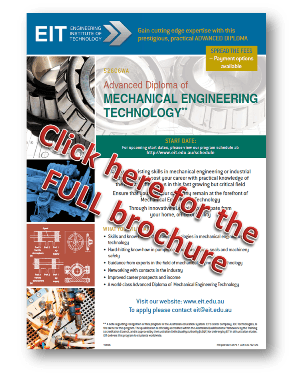
Fee Information
Course Fees
What are the fees for my country?
The Engineering Institute of Technology (EIT) provides distance education to students located almost anywhere in the world – it is one of the very few truly global training institutes. Course fees are paid in a currency that is determined by the student’s location. A full list of fees in a currency appropriate for every country would be complex to navigate and, with today’s exchange rate fluctuations, difficult to maintain. Instead we aim to give you a rapid response regarding fees that is customised to your individual circumstances.
We understand that cost is a major consideration before a student commences study. For a rapid reply to your enquiry regarding courses fees and payment options, please enquire via the below button and we will respond within 2 business days.
EIT Advanced Diploma Course Payment Options
Two payment options are available for the Advanced Diploma courses;
OPTION 1 - PAY UPFRONT
Pay total amount upfront to receive a 5% reduction in fees.
OPTION 2 - MONTHLY PAYMENTS BY CREDIT CARD
This option allows for even monthly payments. The first payment is required at least four weeks before the course starts, then one on the same date every month for the remaining period. For the duration of the program, you receive access to the complete electronic library of technical manuals published by IDC Technologies which contains over 160 manuals with more than 40,000 pages of useful content.
Discounts are available for group bookings
For a rapid reply to your query regarding course fees and payment options, please contact us with your name, email address, course title(s), and location using the form below, and we will respond within 2 business days.
More Courses
More courses available from EIT's School of Mechanical Engineering
Accredited Diploma and Advanced Diploma Programs
Professional Development Series
- Advanced Professional Certificate in Applied Industrial Thermodynamic Systems for Power Generation, HVAC, Refrigeration, Aviation
- Professional Certificate of Competency in Chemical Engineering and Plant Design
- Professional Certificate of Competency in Gas Turbine Engineering
- Professional Certificate of Competency in Mechanical Engineering
- Professional Certificate of Competency in Fundamentals of Process Plant Layout and Piping Design
- Professional Certificate of Competency in Heating, Ventilation and Air-Conditioning (HVAC)
- Professional Certificate of Competency in Onshore and Offshore Pipeline Systems
Mechanical Engineering encompasses the conceptualisation, design, manufacture, control and maintenance of machines ranging from a conveyer, space shuttle to nanotechnology based objects. In broad terms, mechanical engineering channels the energy and forces in nature to the service of people. The fields in which mechanical engineering professionals operate are wide - ranging from oil and gas, power generation, water utilities, process plants, mining, pharmaceuticals, manufacturing and defence.
A diploma or course in mechanical engineering is ideal for anyone wanting to get involved in the general engineering (whether design or maintenance) of large plants, especially as a plant engineer. Recently, mechanical engineering has begun to include many new systems in the electronics and control arena such as programmable logic controllers (PLCs) and SCADA as these are critical to the control of mechanical devices.
Students in EIT's School of Mechanical Engineering can study Mechanical Engineering courses with subjects that include: mechanics, structural engineering, drive systems, rotating equipment, hydraulics, pneumatics, lubrication engineering, HVAC, pumps, compressors, machinery safety, energy efficiency and renewable energy sources.
The focus in EIT's School of Mechanical Engineering is in providing students with both deep and broad skills in mechanical engineering technology, focusing on real systems. Whilst there is probably not a shortage of theoretically orientated practitioners in mechanical engineering, there is a need for highly skilled, practically oriented engineers, technologists and technicians, due to the rapidly increasing use of new technologies which are becoming a key component of all modern plants and equipment. Studying our mechanical engineering programs online means that you do not have to take extended periods away from existing work commitments.
Note:
I: Vocational Education & Training (VET) program
II: Higher Education program
Reviews & Frequently Asked Questions
How to Stay Alive and Flourish
One of EIT's South African students, Rephinus Omoro, recently graduated from the Advanced Diploma of Mechanical Engineering. When Rephinus started investigating further study he was working for Kusile Fabrication Pty Ltd, as their CNC Foreman; responsible for programming the Computer Numerical Control (CNC) machines and overseeing the machining production process.
Rephinus finds his work fulfilling however he was looking to upgrade his skills and anticipating opportunities for a promotion. Because he wasn’t able to put work on hold while studying, the EIT became an attractive option; online, flexible and specialising in a range of engineering fields. Read his full story here.
Henry Ulgen is another EIT student who has been able to advance his career in Australia thanks to his participation in this Advanced Diploma: "My enrolment with EIT has assisted me in securing a new job in production management as I am able to demonstrate that I am working towards gaining a technical qualification".
Knowledge is Power - Mmetli Lesoletsile, Debswana Diamond Company, Botswana
In November 2015 I was nominated to act as Planning Coordinator which is a management position. This was after I shared details of my Advanced Diploma Course with EIT with my employer. One thing that he wants to see is that employees are progressing in terms of education. What he likes about EIT is that no work time is lost by employees going away to study.
Now that EIT has introduced degree courses, I can’t wait to enroll after I complete my Advanced Diploma, and now I have support from my Employer. Besides promotion, one thing that I see and my employer has picked up as well, is that my approach to work has changed completely, which is something positive.
It is true, knowledge is power.
"I had a wonderful time, really enjoyed this program, I would like to thank you for your support and help during this. EIT has a wonder support team, thankful for that, I would definitelyrecommend EIT to my friends. I feel ready to face the real world." A. Sahib (Canada)
“My enrolment in the AdipEng with EIT has assisted me in securing a new job in production management as I am able to demonstrate that I am working towards gaining a technical qualification”. H. Ulgen (Australia)
"I am so excited to complete my 18 months of intensive studying with EIT and about to acquire my highest qualification. It really makes me proud as it has added value in my life. I remember at one point things went so difficult that I thought of calling it quits, but your support was overwhelming and came at a time when I needed it the most. Thanks a lot for that." T. Moesi (Botswana)
"This is a good course and would love to see more people enrolling, you are educating the world EIT, i like that, you are bringing hope to those who were hopeless." M. Lesoletsile (Botswana)
Any questions? Click here to view our Frequently Asked Questions.
Education Pathways
Education Pathways - Choose a path that is right for you
EIT now has several education pathways available to you, allowing you more flexibility and choice.
- Pathway WITH Credit
Completing an EIT Advanced diploma provides a convenient exit point which ensures that you still receive a qualification should you need withdraw from your studies early. If you successfully complete an EIT Advanced Diploma and choose to continue your studies, you will be eligible to receive credit for a significant proportion of an EIT bachelor degree, fast-tracking your studies.
Alternatively, if you have completed a prior qualification from another institution, you may still be eligible to apply for credit. If successful, you may choose to progress through a Bachelor degree, with part-time or full-time, completing the required units as they are scheduled.
- Pathway WITHOUT Credit
If you are not eligible to apply for credit, you can enter directly into our Bachelor program, and select either a full-time or part-time intensive study load depending on your personal circumstances.
You are now able to progress smoothly through to a Master qualification, with our unique, practical delivery model. In some cases you are able to select between our interactive online approach or classroom based learning (or a combination of both); however this is subject to availability. Please contact us for more information.
The diagram included below aims to help you understand how you can seamlessly progress your engineering career with EIT in a successful way. The options include: part-time and full-time study mode; pathways with and without credit; and suitable "exit" or "rest" points that allow you to earn accredited and valuable qualifications while you continue to work. You can also view the Online Routes to Engineering Career Success diagram by clicking here.
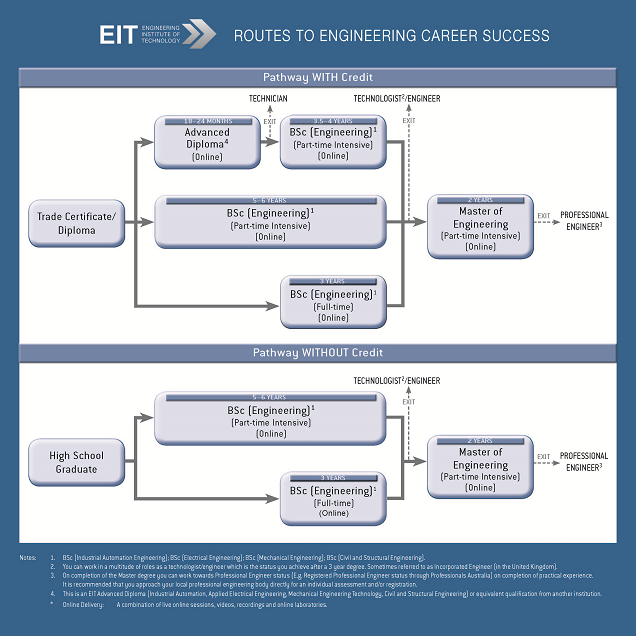
- Details
- Written by: idc-and-eit-have-launched-their-ebook-library-pdf-format
Now you can take our technical manuals everywhere with you!
Our eBooks are now in PDF format and compatible with:
- Windows
- Macintosh
- Linux
- iOS - iPad, iPhone, i-Pod Touch, iOS 4.0 or later
All eBooks are available at 40% less of the cost of our hard copy manuals – at that price what are you waiting for?
Order through the IDC Technologies website using the offer IDCEBK.
NB: To view our eBooks you will need to install Adobe Acrobat or Reader software and the FileOPen plugin (www.fileopen.com).
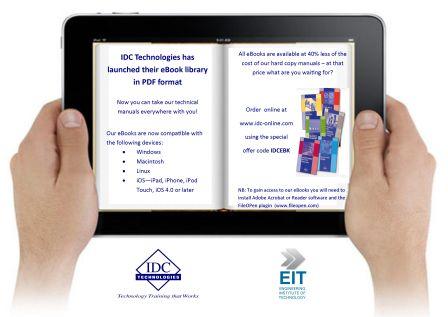
- Details
- Written by: giveaway-time-your-free-ebook
We have recently launched our eBooks in a new PDF format making it easier for you to take practical know-how with you where ever you go!
Our eBooks are now compatible with the following devices:
- Windows
- Macintosh
- Linux
- iOS - iPad, iPhone, iPod Touch, iOS 4.0 or later
NB: To gain access to our eBooks you will need to install Adobe Acrobat or Reader software and the FileOPen plugin (www.fileopen.com)
In conjunction with our sister company, the EIT, we are giving away 5 copies of one of our most popular eBooks "Practical Project Management for Engineers and Technicians"
To enter, simply go to the News menu at the top of the screen and select the eBook Giveaway - Enter Now! tab and enter your details.
Entries close on Tuesday the 9th of October - enter now!
- Details
- Written by: become-eit-instructor
Turn your technical and engineering expertise, excellent communication skills and experience into a rewarding part-time instructing opportunity. We're expanding our instructor force to meet the growing demand for our training programs all over the world via our E-learning opportunities.
A few reasons to become an EIT Instructor:
1. Realise big rewards for a part-time assignment
As an EIT instructor, you instruct part time - based on your own schedule. You are free to spend the majority of your time pursuing other professional opportunities and goals.
2. Enjoy full operational support for easy course execution
Each course has a Learning Support Officer to assist in providing you with support and to make your time instructing an enjoyable and rewarding experience.
3. Expand your skills
You have the opportunity to expand your skills by taking advantage of our e-learning program. You will receive training on the webinar software and also receive feedback from the Learning Support Officers.
4. Find scheduling flexibility
Our support staff is available to help manage your schedule.
5. Deliver unbiased instruction
The EIT develops its own course materials independently of software vendors. You present a balanced and objective view of the technologies and skills. These are designed to enable students to immediately apply them in the workplace. You will also have the opportunity to tailor the materials to suit your style.
Starting the process is easy!
The EIT requires hands-on technical experience, expertise and excellent communication skills. Our instructors enjoy flexibility as they teach for the EIT while pursuing other commitments.
Email your CV to
- Details
- Written by: engineering-s-future-leaders-mater-dei-college
Engineering Education and Careers on Show
The Engineering Institute of Technology’s Dean of Engineering Dr. Steve Mackay visited Edgewater’s Mater Dei College to speak to year 10 and 11 maths, science and engineering students about the value of engineering education and the numerous advantages of choosing a career in engineering.
Approximately 45 students attended the presentation, covering a number of topics such as studying engineering at university, the advantages of an engineering career, and examples of failures in engineering - demonstrating the high degree of accuracy required of the profession. Dr. Mackay pointed to financial rewards, travel requirements, job satisfaction, and the opportunity to think creatively and innovate as major benefits of a career in engineering, as well as naming communication and interpersonal skills as attributes every engineer should possess.
The presentation comes at a time when Australia’s skill shortage of engineers and technicians in the resources sector is a current cause for concern in the industry. Encouraging high school children to undertake engineering study is an important step in combatting this issue, and one that is welcomed by the industry.
The Engineering Institute of Technology (EIT) is an institute of higher learning that delivers leading edge engineering and technological education online. It is the sister organisation of IDC Technologies, a global provider of technology training to corporate clients, and practicing engineers and technicians.
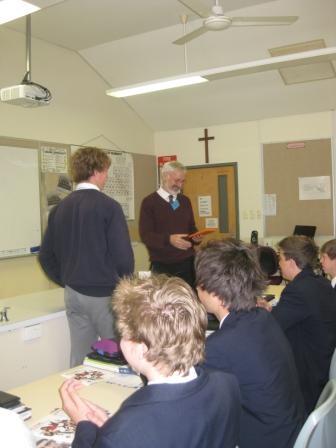 |
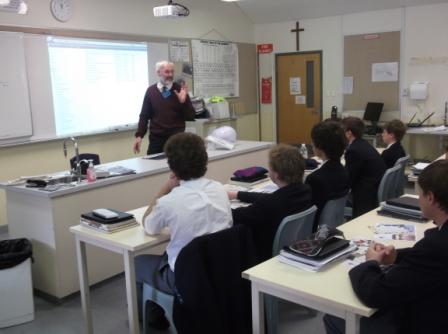 |
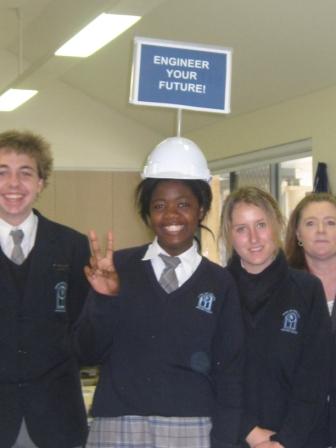 |
- Details
- Written by: weve-extended-our-ebook-giveaway
eBook offer extended!
5 winners have been drawn for their FREE copy of the eBook "Practical Project Management for Engineers and Technicians".
Due to an overwhelming response, we are offering another 3 COPIES to another 3 entrants!
To enter, simply go to the News menu at the top of the screen and select the eBook Giveaway - Enter Now! tab and enter your details.
Second round of entries close on Wednesday the 17th of October - enter now!



